#John Nicolson
Explore tagged Tumblr posts
Text
John Nicolson

Physique: Average Build Height: 5′ 9″
John MacKenzie Nicolson (born 23 June 1961) is a Scottish journalist, broadcaster and Scottish National Party (SNP) politician. Nicolson served as the SNP Member of Parliament (MP) for Ochil and South Perthshire from 2019 general election until the seat's abolition in 2024. He was previously the MP for East Dunbartonshire, having been elected at the 2015 general election, and defeated at the 2017 general election.





Born in Glasgow, Nicolson won a bursary to Hutchesons' Grammar School, and is the first generation of his family to go to university. He graduated from the University of Glasgow with a MA (Hons.) in English literature and Politics. He was awarded a Kennedy Scholarship for postgraduate study in the United States, and was Harkness Fellow in American Government at the Kennedy School of Government, Harvard.



After graduating from Harvard, he worked as a speechwriter on Capitol Hill for Senator Daniel Patrick Moynihan specializing in Israel-Palestinian issues, the Irish peace process, and gun control. John rose to prominence in broadcasting as the presenter of BBC Breakfast and ITV’s Live with John Nicolson. He also contributed to significant programs such as Newsnight and Panorama, reporting from conflict zones like Iraq and the Gulf.




Nicolson lives in Bearsden in north Glasgow with his long-term partner Juliano Zini. I don’t really know anything about him, other than he’s gay and I want to fuck him. But what is most important is that he is really, really cute. I am not sure if his long-term partner would allow a weekend fuck session that just involves the two of us, but I can fantasize. And I do fantasize.

100 notes
·
View notes
Text

6 notes
·
View notes
Text
THIS DAY IN GAY HISTORY
based on: The White Crane Institute's 'Gay Wisdom', Gay Birthdays, Gay For Today, Famous GLBT, glbt-Gay Encylopedia, Today in Gay History, Wikipedia, and more … December 4



1777 – Juliette Récamier, French socialite born (d.1849); a Frenchwoman who was a leader of the literary and political circles of the early and considered to be the most beautiful woman of her time. Born in Lyon and known as Juliette, she was married at fifteen to Jacques Récamier a rich banker more than 30 years her senior. At the time, it was said that he was in fact her natural father who married her to make her his heir. Beautiful, accomplished, with a real love for literature, she possessed at the same time a temperament which protected her from scandal, and from the early days of the French Consulate to almost the end of the July Monarchy her salon in Paris was one of the chief resorts of literary and political society that pretended to fashion.
The habitués of her house included many former royalists, with others, such as Jean-Baptiste Bernadotte and Jean Victor Marie Moreau, more or less disaffected to the government. This circumstance, together with her refusal to act as lady-in-waiting to Empress consort Josephine de Beauharnais and her "friendship" for Anne Louise Germaine de Staël, brought her under suspicion.
When a history says someone's sex life is "unconventional" it can sometimes mean little more than the subject enjoyed something other than the standard missionary position with his clothes on and the lights off. When a woman's sex life is even mentioned, no less described as "unconventional" then you better sit up and take notice. Madame de Stael was such a woman. In 1798, separated from her own husband and living with yet another male lover, she met up with Madame Recamier. De Staël was 31, Juliette was ten years younger.
"She fixed her great eyes upon me," wrote Juliette, "and paid me compliments about my figure which might have seemed exaggerated and too direct had they not seemed to have escaped from her. From that time on, I thought only of Mme. de Staël."
They lived together for the next 19 years until de Staël died. Her final words to Recamier, to whom she had once written, "I love you with a love that surpasses that of friendship," were "I embrace you with all that is left of me."


1875 – Rainer Maria Rilke, Austrian poet (d.1926); Austria's greatest modern poet is included here because Harold Nicolson, who knew him, and whose perception generally demands consideration and respect, believed Rilke to be Gay. W.H. Auden once dismissed Rilke as "the greatest Lesbian poet since Sappho." Since Auden wasn't on particularly good terms with Harold Nicolson, it's more than likely that he came to his own conclusion about there being something "different" about the poet.
For many years, Rilke lived in Paris, where he was secretary to the sculptor Augúste Rodin, himself supposedly Gay. Since Rodin was an intimate of Diaghelev and Nijinsky, it seems unlikely that Rilke did not move in the same Gay circle. Cocteau, for example, knew the poet and even invented a story that Rilke had been in love with him.


1936 – John Giorno (d.2019) was an American poet and performance artist. He founded the not-for-profit production company Giorno Poetry Systems and organized a number of early multimedia poetry experiments and events, including Dial-A-Poem. He became prominent as the subject of Andy Warhol's film Sleep (1964). He was also an AIDS activist and fundraiser, and a long-time practitioner of the Nyingma tradition of Tibetan Buddhism.
Giorno was born in New York City, and was raised both in Brooklyn and the Long Island town of Roslyn Heights. He attended high school at James Madison High School in Brooklyn and graduated from Columbia University in 1958, where he was a "college chum" of physicist Hans Christian von Baeyer. While in his early twenties, he briefly worked in New York City as a stockbroker. In 1962 he met Andy Warhol during Warhol's first New York Pop Art solo exhibit at Eleanor Ward's Stable Gallery. They became lovers and Warhol remained an important influence for Giorno's developments in poetry, performance and recordings.
Warhol's 1964 silent film Sleep shows Giorno sleeping on camera for more than five hours. A lesser-known Warhol film featuring Giorno, John Washing (also 1963), runs a mere 4½ minutes. Giorno and Warhol are said to have remained very close until 1964, after which time their meetings were rare. Their relationship was revived somewhat in the last year before Warhol's death. Inspired by Warhol, and subsequent relationships with Robert Rauschenberg and Jasper Johns, Giorno began applying Pop Art techniques of appropriation of found imagery to his poetry.Giorno died of a heart attack at age 82 on October 11, 2019, at his home in Lower Manhattan. At the time of his death, he was married to Swiss artist Ugo Rondinone.


1940 – Richard Robbins (d.2012) was an American-born composer, best known for his motion picture scores for the Merchant Ivory films.
Richard Robbins was born in South Weymouth, Massachusetts and began his musical studies at the age of five. A graduate of the New England Conservatory, he received a Frank Huntington Beebe Fellowship and continued his studies in Vienna, Austria.
In 1976, while he was acting director of the Preparatory School at Mannes College of Music, Robbins taught the youngest daughter of Ruth Prawer Jhabvala, the noted novelist, screenwriter and winner of the Man Booker Prize for her novel Heat and Dust. Jhabvala introduced Robbins to filmmakers Ismail Merchant and James Ivory, which launched their longtime collaboration.
James Ivory has said of Robbins: "I always felt that if anything happened to him and we didn't have his music, then it really wouldn't be a Merchant Ivory film. His music was integral to our films."
Robbins first work in film was Sweet Sounds, a documentary about gifted five-- year old music students, conceived and directed by Robbins and produced by Merchant and Ivory. Robbins also composed the score for the 1983 film adaptation of Jhabvalas' Heat and Dust.
Robbins went on to create the score for nearly every Merchant-Ivory film from The Europeans in 1979 to The White Countess in 2005.
He won a Golden Osella from the Venice Film Festival for Maurice (1987), was nominated for two Academy Awards for Best Original Score for Howards End (1992) and The Remains of the Day (1993). His score for A Room with a View (1985) won him a British Academy Award.
Robbins work was honored in 1996 at a gala benefit concert at Carnegie Hall supporting AIDS research. Robbins was passionate about his dogs , his gardens, and all aspects of the natural world.
His long-time partner was painter Michael T. Schell. In 1994, the couple collaborated on Via Crucis, a musical and visual collage representing the Stations of the Cross.
Richard Robbins died on November 7, 2012 at age 71 at his home in Rhinebeck, New York , following a long struggle with Parkinsons disease.
The clip below is the music from the end titles of Maurice, the Merchant-Ivory film based on E. M. Forster's novel of homosexual awakening and love. (2m38s)
youtube


1959 – Jon Ginoli, born in Peoria, Illinois, is an American guitarist. He is best known as a member of the band Pansy Division, which was founded by Ginoli and Chris Freeman in 1991. Pansy Division is known as one of the founding examples of the queercore genre of punk rock. He is openly gay.
Ginoli, with Pansy Division, was featured in the 1997 documentary film Queercore: A Punk-U-Mentary by Scott Treleaven; as an actor, in the 2002 comedy short Going West by Michael Mew; and in the 2008 film Pansy Division: Life in a Gay Rock Band by Michael Carmona.
Prior to Pansy Division, Ginoli was a singer, songwriter and guitarist for an indie band called The Outnumbered, which he formed while an undergraduate at the University of Illinois at Urbana-Champaign. While in college, Ginoli served a short stint as a DJ at Urbana radio station WPGU. Ginoli is a 1978 graduate of Richwoods High School. In 1977 he created his own rock and roll fanzine, Hoopla.


Bettel (R) with husband Gauthier Destenay
2013 – Openly gay Xavier Bettel (born 3 March 1973) is sworn in as Luxembourg’s Prime Minister. He is a Luxembourgish politician and lawyer, serving as the 24th Prime Minister of Luxembourg since 4 December 2013 after succeeding Jean-Claude Juncker.
Bettel is Luxembourg’s first openly gay Prime Minister and, worldwide, the third openly gay head of government following Iceland’s Prime Minister Jóhanna Sigurðardóttir (born 4 October 1942) (2009–2013) and Belgium’s Prime Minister Elio Di Rupo (born 18 July 1951) (2011–2014).As of 2017, he is one of three openly gay world leaders in office, the others being Leo Varadkar (born 18 January 1979), the Taoiseach of Ireland; and Ana Brnabić (born 28 September 1975), the Prime Minister of Serbia. Bettel has been in a partnership with Gauthier Destenay since March 2010. They married on 15 May 2015; same-sex marriage law reforms had come into effect on 1 January 2015, after passing in June 2014.


6 notes
·
View notes
Text

why didn’t they ask evans? a doctor who x agatha christie au
Someone tries to kill Rory after he remembers the seemingly meaningless last words of a dying man. He and Amy then decide to investigate the “accidental” death of the Ninth Doctor.
Amy as Frankie, Rory as Bobby, Eleven as Roger, Martha as Sylvia, Ten as Henry, Twelve as Dr. Nicolson, River as Moira, Nine as Alan, Missy & the Master as the Caymans, Jack as John, Donna as Rose and Rose as Gladys.
#doctor who au#agatha christie#amy pond#rory williams#river song#eleventh doctor#martha jones#twelfth doctor#I’m in the part of my dw fixation where I read an unrelated book and cast the dw cast to fill the roles
8 notes
·
View notes
Text
Yes Virginia, The Nazis Were Fascists - Part Two
(this is part two of a continuation of a discussion we've been having with an Anon who challenged us to define fascism. In our previous response, we provided Anon with a photo of a poster from the United States Holocaust Memorial Museum, a bullet list from Yale professor Jason Stanley, quotes from William Reich, Ludwig von Mises, Harold Nicolson, Franklin D. Roosevelt, Henry A. Wallace, Marcus Garvey, a link to a video breakdown of the subject by Philosophy Tube, and recommendations to read books by historians Mark Bray, Robert O. Paxton, Umberto Eco, and Hannah Arendt - all of whom have published key works on the topic. Anon did not do his homework and instead sent us an immediate reply, informed solely by the two images we included in our response, ignoring everything else we cited. His reply includes some, uhh, pretty incredulous claims. In this post, we crack our knuckles, get someone to hold our beer, and tee off).
ANON: Going by the first image, the nazis weren't fascists. They didn't have religion and government intertwined and Hitler actually talked about how he would eradicate christianity after judaism. AI: The nazis absolutely intertwined religion and government. Hitler's desire to eradicate Christianity stemmed from his desire to supplant the authority of the church with the authority of the state, believing that "political control could then be applied to make the whole Church an instrument of the nazi party." (John S. Conway, Nazi Persecution, p. 34). You're right about nazi repression of Christianity and Judaism (see Christopher Tatara, "Himmler, Hitler, and Christianity in the Early Third Reich"). But you miss the part where their intention was to replace religious devotion and authority with state devotion and authority. Many nazi leaders, contemptuous of Judeo-Christianity, sought to replace those religious traditions with occultism, Nordic paganism, nature worship, or even an "Aryanized" Christianity, worshipping a blonde, blue-eyed Jesus. But more than that, the nazis attempted to replace religious devotion with devotion to nazi ideology and worship of the state itself, positioning Hitler somewhere between a prophet and a god.
50 notes
·
View notes
Text
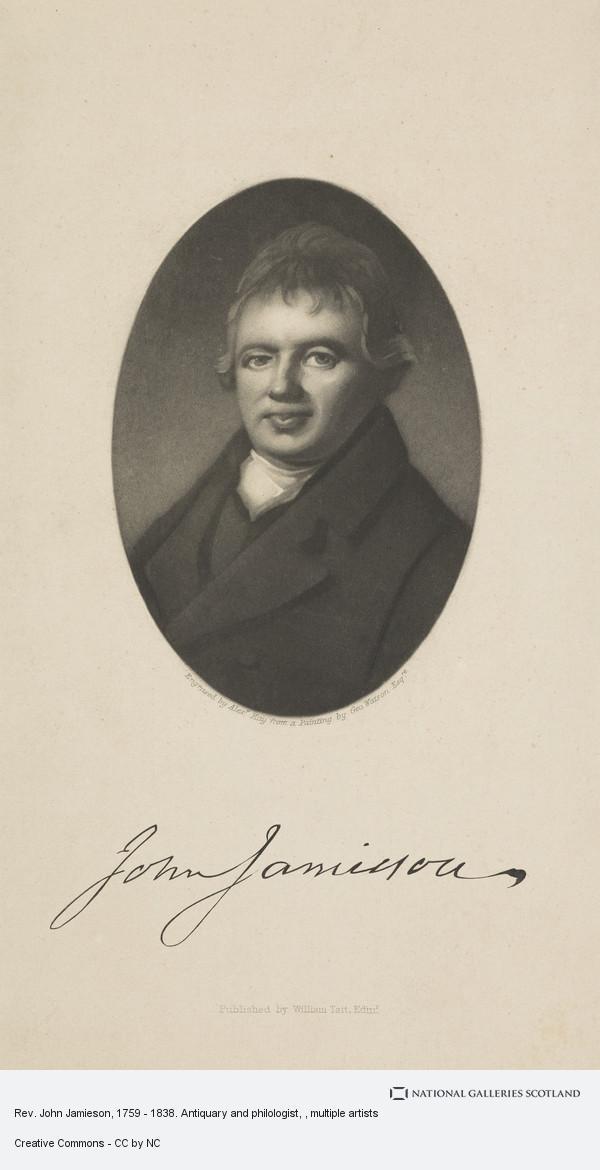
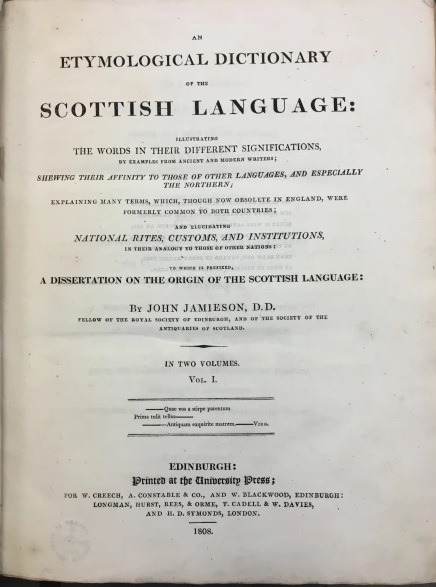
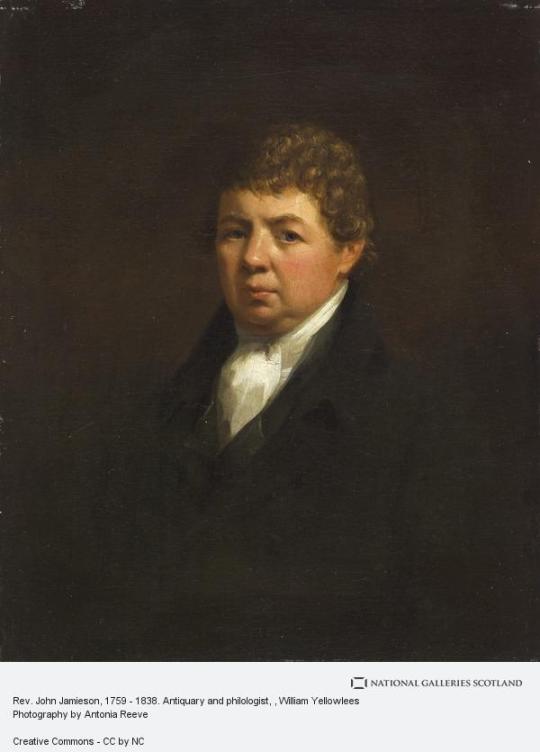
On March 5th 1759 the lexicographer and church minister John Jamieson was born in Glasgow.
I know most of you will not have heard of Jamieson, but his publication, Etymological Dictionary of the Scottish Language, is credited with keeping the language alive. He was a bit of a polymath though and learned in many fields.
The language I am talking about here is Scots, the Scot’s Tongue as it is often referred to, If you have read some of my posts I like to dig out documents etc from days gone by, a most of these are written in Scots, you only have to read the poetry of Robert Fergusson or Rabbie Burns, the vast majority which is written in the language, or up to modern times if you have read any of Irvine Welsh’s books, you will know that as a language it is distinctly different to what is termed as “proper English”
Anyway a bit about the man, Jamieson grew up in Glasgow as the only surviving son in a family with an invalid father, he entered Glasgow University aged at the staggeringly young age of just nine! From 1773 he studied the necessary course in theology with the Associate Presbytery of Glasgow, and in 1780 he was licensed to preach.
Jamieson was appointed to serve as minister to the newly established Secession congregation in Forfar, and stayed there for the next eighteen years, during which time he married Charlotte Watson, the daughter of a local widower, and started a family. Their marriage lasted fifty-five years and they had seventeen children, ten of whom reached adulthood, although only three outlived their father. He next became minister of the Edinburgh Nicolson Street congregation in 1797 where he guided the reconciliation of the Burgher and Anti-Burgher sects to a union in 1820.
In 1788 Jamieson’s writing was recognised by Princeton College, New Jersey where he received the degree of Doctor of Divinity. His other honours included membership of the Society of Scottish Antiquaries, of the Royal Physical Society of Edinburgh, of the American Antiquarian Society of Boston, United States, and of the Copenhagen Society of Northern Literature. He was also a royal associate of the first class of the Royal Society of Literature instituted by George IV.
Jamieson’s chief work, the Etymological Dictionary of the Scottish Language was published in two volumes in 1808 and was the standard reference work on the subject until the publication of the Scottish National Dictionary in 1931. He published several other works, but it is the dictionary he is best known for.
He had a particular passion for numismatics, and it was their mutual interest in coins which led to the first meeting between Jamieson and Walter Scott, in 1795, when Scott was only twenty-three and not yet a published author. Jamieson was also a keen angler, as the many entries relating to fishing terms in the Dictionary attest; and published occasional works of poetry, including a poem against the slave trade which was praised by abolitionists in its day. Entries provided by Scott include besom, which he described as a “low woman or prostitute,” and screed, defined as a “long revel” or “hearty drinking bout”. I wonder how many Scottish females have been called “a wee besom” by their mothers with neither really knowing it’s true meaning!
Jamieson’s association with Walter Scott was a two way thing, he wrote a Scots poem ‘The Water Kelpie’ for the second edition of Minstrelsy of the Scottish Border.
It was through his antiquarian research that Jamieson developed his practice of tracing words (particularly place-names) to their earliest form and occurrence: a method which was to be the foundation of the historical approach he would use in the Dictionary.
Jamieson wrote on other themes: rhetoric, cremation, and the royal palaces of Scotland, besides publishing occasional sermons. In 1820 he issued edited versions of Barbour’s The Brus and Blind Harry’s Wallace.
Revered by authors including Hugh MacDiarmid, who used it to shape his poetic output, Jamieson’s dictionary has long been regarded as a crucial groundwork which kept alive the Scots language at a time when it was in danger of falling into obscurity.
John Jamieson died on July 22nd 1839 and has a fine gravestone in St Cuthbert’s graveyard in Edinburgh, as seen in the fourth pic.
13 notes
·
View notes
Text
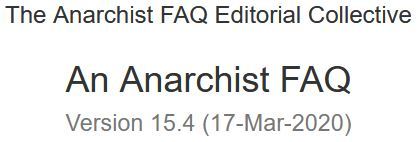
Bibliography for FAQ
Non-Anarchist Works
Adams, Arthur E., Bolsheviks in the Ukraine: the second campaign, 1918–1919, Yale University Press, New Haven, 1963
Anderson, Terry L. and Leal, Donald R., Free Market Environmentalism, Pacific Research Institute for Public Policy,San Francisco, 1991.
Anweiler, Oskar, The Soviets: The Russian Workers, Peasants, and Soldiers Councils 1905–1921, Random House, New York, 1974.
Archer, Abraham (ed.), The Mensheviks in the Russian Revolution, Thames and Hudson Ltd, London, 1976.
Arestis, Philip, The Post-Keynesian Approach to Economics: An Alternative Analysis of Economic Theory and Policy, Edward Elgar Publishing Ltd., Aldershot, 1992.
Armstrong, Philip, Glyn, Andrew and Harrison, John, Capitalism Since World War II: The making and breakup of the great boom, Fontana, London, 1984.
Capitalism Since 1945, Basil Blackwell, Oxford, 1991.
Arrow, Kenneth, “Economic Welfare and the Allocation of Resources for Inventiveness,” in National Bureau of Economic Research, The Rate and Direction of Inventive Activity, Princeton University Press, 1962.
Aves, Jonathan, Workers Against Lenin: Labour Protest and the Bolshevik Dictatorship, Tauris Academic Studies, London, 1996.
Bain, J.S., Barriers in New Competition: Their Character and Consequences in Manufacturing Industries, Harvard University Press, Cambridge, 1967.
Bakan, Joel, The Corporation: The Pathological Pursuit of Profit and Power, Constable, London, 2004.
Bakunin, Michael, The Confession of Mikhail Bakunin, Cornell University Press, Ithaca, N.Y., 1977.
Bukharin, Nikolai, Economy Theory of the Leisure Class, Monthly PressReview, New York/London, 1972.
Bagdikian, Ben H., The New Media Monopoly, Beacon Press, Boston, 2004.
Baldwin, William L., Market Power, Competition and Anti-Trust Policy, Irwin, Homewood, Illinois, 1987.
Balogh, Thomas, The Irrelevance of Conventional Economics,Weidenfield and Nicolson, London, 1982.
Baran, Paul A. and Sweezy, Paul M., Monopoly Capital, Monthly Press Review, New York, 1966.
Baron, Samuel H., Plekhanov: the Father of Russian Marxism, Routledge & K. Paul, London, 1963
Barry, Brian, “The Continuing Relevance of Socialism”, in Thatcherism, Robert Skidelsky (ed.), Chatto & Windus, London, 1988.
Beder, Sharon, Global Spin: The Corporate Assault on Environmentalism, Green Books, Dartington, 1997.
Beevor, Antony, The Spanish Civil War, Cassell, London, 1999.
The Battle for Spain: The Spanish Civil War 1936–1939, Phoenix, London, 2006.
Berghahn, V. R., Modern Germany: society, economy and politics in the twentieth century, 2nd ed., Cambridge University Press, Cambridge, 1987.
Berlin, Isaiah, Four Essays on Liberty, Oxford University Press, Oxford, 1969.
Bernstein, Michael A., The Great Depression: Delayed recovery and Economic Change in America, 1929–1939, Cambridge University Press, New York, 1987.
Beynon, Huw, Working for Ford, Penguin Education, London, 1973.
Binns, Peter, Cliff, Tony, and Harman, Chris, Russia: From Workers’ State to State Capitalism, Bookmarks, London, 1987.
Blanchflower, David and Oswald, Andrew, The Wage Curve, MIT Press, Cambridge, Mass., 1994.
Blinder, Alan S. (ed.), Paying for productivity: a look at the evidence, Brookings Institution, Washington, D.C, 1990.
Blum, William, Killing Hope: US Military and CIA Interventions Since World War II, 2nd edition, Zed Books, London, 2003.
Rogue State: A Guide to the World’s Only Superpower, 3rd edition, Zed Books, London, 2006.
Böhm-Bawerk, Eugen, Capital and Interest, Libertarian Press, South Holland,Ill., 1959.
Bolloten, Burnett, The Spanish Civil War: Revolution and Counter Revolution, Harvester-Wheatsheaf, New York, 1991.
Boucher, Douglas H. (ed.), The Biology of Mutualism: Biology and Evolution, Croom Helm , London, 1985.
Bourne, Randolph, Untimely Papers, B.W. Huebsch, New York, 1919.
War and the Intellectuals: Essays by Randolph S. Bourne 1915–1919, Harper Torchbooks, New York, 1964.
Bowles, Samuel and Edwards, Richard (Eds.), Radical Political Economy, (two volumes), Edward Elgar Publishing Ltd., Aldershot, 1990.
Bowles, Samuel and Gintis, Hebert, Schooling in Capitalist America: Education Reform and the Contradictions of Economic Life, Routledge & Kegan Paul, London, 1976.
Braverman, Harry, Labour and Monopoly Capital: The Degradation of Work in theTwentieth Century, Monthly Review Press, New York, 1974.
Brecher, Jeremy, Strike!, South End Press, Boston, 1972.
Brecher, Jeremy and Costello, Tim, Common Sense for Hard Times, Black Rose Books, Montreal, 1979.
Brenan, Gerald, The Spanish Labyrinth: An Account of the Social and Political of the Spanish Civil War, 2nd Edition, Cambridge University Press, Cambridge, 1976.
Broido, Vera, Lenin and the Mensheviks: The Persecution of Socialists under Bolshevism, Gower Publishing Company Limited, Aldershot, 1987.
Brovkin, Vladimir N., From Behind the Front Lines of the Civil War: political parties and social movements in Russia, 1918–1922, Princeton University Press, Princeton, N.J, 1994.
The Mensheviks After October: Socialist Opposition and the Rise of the Bolshevik Dictatorship, Cornell University Press, Ithaca, 1987. Russia after Lenin : politics, culture and society, 1921–1929, Routledge, London/New York, 1998
Brovkin, Vladimir N. (ed.), The Bolsheviks in Russian Society: The Revolution and Civil Wars, Yale University Press, New Haven and London, 1997.
Bunyan, James, The Origin of Forced Labor in the Soviet State, 1917–1921: Documents and Materials, Johns Hopkins University Press, Baltimore, 1967.
Byock, Jesse, Viking Age Iceland, Penguin Books, London, 2001
C.P.S.U. (B), History of the Communist Party of the Soviet Union (Bolsheviks), International Publishers, New York, 1939.
Cahm, Eric and Fisera, Vladimir Claude (eds), Socialism and Nationalism, Spokesman, Nottingham, 1978–80.
Carr, Edward Hallett, The Bolshevik Revolution: 1917–1923, in three volumes, Pelican Books, 1966.
The Interregnum 1923–1924, Penguin, Harmondsworth, 1969.
Carr, Raymond, Spain: 1808–1975, 2nd Edition, Clarendon Press, Oxford, 1982.
Carrier, James G. (ed.), Meanings of the market: the free market in western culture, Berg, Oxford, 1997.
Chandler, Lester V., America’s Greatest Depression, 1929–1941, Harper & Row, New York/London, 1970.
Chang, Ha-Joon, Kicking Away the Ladder: Development Strategy in Historic Perspective, Anthem Press, London, 2002.
Bad samaritans: rich nations, poor policies and the threat to the developing world, Random House Business, London, 2007
Clark, J.B., The Distribution of Wealth: A theory of wages, interest and profits, Macmillan, New York, 1927
Cliff, Tony, Lenin: The Revolution Besieged, vol. 3, Pluto Press, London,1978.
Lenin: All Power to the Soviets, vol. 2, Pluto Press, London,1976. State Capitalism in Russia, Bookmarks, London, 1988. “Trotsky on Substitutionism”, contained in Tony Cliff, Duncan Hallas, Chris Harman and Leon Trotsky, Party and Class,Bookmarks, London, 1996. Trotsky, vol. 3, Bookmarks, London, 1991. Revolution Besieged: Lenin 1917–1923, Bookmarks, London, 1987.
Cohen, Stephan F., Bukharin and the Bolshevik Revolution, Oxford University Press, London, 1980.
“In Praise of War Communism: Bukharin’s The Economics of the Transition Period”, pp. 192–203, Revolution and politics in Russia: essays in memory of B.I. Nicolaevsky, Alexander and Janet Rabinowitch with Ladis K.D. Kristof (eds.).
Collins, Joseph and Lear, John, Chile’s Free-Market Miracle: A Second Look,Institute for Food and Development Policy, Oakland, 1995.
Communist International, Proceedings and Documents of the Second Congress1920, (in two volumes), Pathfinder, New York, 1991.
Confino, Michael (ed.), Daughter of a Revolutionary: Natalie Herzen and the Bakunin-Nechayev Circle, Library Press, LaSalle Illinois, 1973.
Cowen, Tyler, “Law as a Public Good: The Economics of Anarchy”,Economics and Philosophy, no. 8 (1992), pp. 249–267.
“Rejoinder to David Friedman on the Economics of Anarchy”, Economics and Philosophy, no. 10 (1994), pp. 329–332.
Cowling, Keith, Monopoly Capitalism, MacMillian, London, 1982.
Cowling, Keith and Sugden, Roger, Transnational Monopoly Capitalism,Wheatshelf Books, Sussez, 1987.
Beyond Capitalism: Towards a New World Economic Order, Pinter, London, 1994.
Curry, Richard O. (ed.), Freedom at Risk: Secrecy, Censorship, and Repression in the 1980s, Temple University Press, 1988.
Curtis, Mark, Web of Deceit: Britain’s real role in the world,Vintage, London, 2003.
Unpeople: Britain’s Secret Human Rights Abuses,Vintage, London, 2004.
Daniels, Robert V., The Conscience of the Revolution: Communist Opposition in Soviet Russia, Harvard UniversityPress, Cambridge, 1960.
Daniels, Robert V. (ed.), A Documentary History of Communism, vol. 1,Vintage Books, New York, 1960.
Davidson, Paul, Controversies in Post-Keynesian Economics, E. Elgar, Brookfield, Vt., USA, 1991.
John Maynard Keynes, Palgrave Macmillan, Basingstoke, 2007
Davis, Mike, Late Victorian Holocausts: El Niño Famines and the Making of the Third World, Verso, London, 2002.
Denikin, General A., The White Armies, Jonathan Cape, London, 1930.
DeShazo, Peter, Urban Workers and Labor Unions in Chile 1902–1927,University of Wisconsin Press, Madison, 1983.
Deutscher, Isaac, The prophet unarmed : Trotsky 1921–1929, Oxford University Press, 1959.
Devine, Pat, Democracy and Economic Planning, Polity, Cambridge, 1988.
Dobbs, Maurice, Studies in Capitalist Development, Routledge & Kegan Paul Ltd., London, 1963.
Dobson, Ross V. G., Bringing the Economy Home from the Market, Black Rose Books, Montreal, 1993.
Domhoff, G. William, Who Rules America Now? A view from the ‘80s, Prentice-Hall, Englewood Cliffs, 1983.
Donaldson, Peter, A Question of Economics, Penguin Books, London, 1985.
Economics of the Real World, 3rd edition, Penguin books, London, 1984.
Dorril, Stephen and Ramsay, Robin, Smear! Wilson and the Secret State, Fourth Estate Ltd., London, 1991.
Douglass, Frederick, The Life and Writings of Frederick Douglass, vol. 2, Philip S. Foner (ed.) International Publishers, New York, 1975.
Draper, Hal, The ‘dictatorship of the proletariat’ from Marx to Lenin, Monthly Review Press, New York, 1987.
The Myth of Lenin’s “Concept of The Party”, available at: http://www.marxists.org/archive/draper/works/1990/myth/myth.htm
Du Boff, Richard B., Accumulation and Power: an economic history of the United States, M.E. Sharpe, London, 1989.
Dubois, Pierre, Sabotage in Industry, Penguin Books, London, 1979.
Eastman, Max, Since Lenin Died, Boni and Liveright, New York, 1925.
Eatwell, Roger and Wright, Anthony (eds.), Contemporary political ideologies, Pinter, London, 1993.
Edwards, Stewart, The Paris Commune 1871, Victorian (& Modern History) Book Club, Newton Abbot, 1972.
Edwards, Stewart (ed.), The Communards of Paris, 1871, Thames and Hudson, London, 1973.
Eisler, Rianne, Sacred Pleasure,
Ellerman, David P., Property and Contract in Economics: The Case forEconomic Democracy, Blackwell, Oxford, 1992.
The Democratic Worker-Owned Firm: A New Model for Eastand West, Unwin Hyman, Boston, 1990. as “J. Philmore”, The Libertarian Case for Slavery, available at: http://cog.kent.edu/lib/Philmore1/Philmore1.htm
Elliot, Larry and Atkinson, Dan, The Age of Insecurity, Verso, London, 1998.
Fantasy Island: Waking Up to the Incredible Economic, Political and Social Illusions of the Blair Legacy, Constable, London, 2007. The Gods That Failed: Now the Financial Elite have Gambled Away our Futures, Vintage Books, London, 2009.
Engler, Allan, Apostles of Greed: Capitalism and the myth of the individual in the market, Pluto Press, London, 1995.
Evans Jr., Alfred B., Soviet Marxism-Leninism: The Decline of an Ideology, Praeger, London, 1993.
Faiwel, G. R., The Intellectual Capital of Michal Kalecki: A study ineconomic theory and policy, University of Tennessee Press, 1975.
Farber, Samuel, Before Stalinism: The Rise and Fall of Soviet Democracy, Polity Press, Oxford, 1990.
Fedotoff-White, D., The Growth of the Red Army, Princeton University Press, Princeton, 1944.
Ferguson, C. E., The Neo-classical Theory of Production and Distribution, Cambridge University Press, London, 1969.
Ferro, Marc, October 1917: A social history of the Russian Revolution, Routledge & Kegan Paul, London, 1980.
Figes, Orlando, A People’s Tragedy: The Russian Revolution 1891–1924, Jonathan Cape, London, 1996.
Peasant Russia, Civil War: the Volga countryside in revolution 1917–1921, Phoenix Press, London, 2001.
Flamm, Kenneth, Creating the Computer: Government, Industry, and High Technology, The Brookings Institution, Washington D.C., 1988.
Forgacs, David (ed.), Rethinking Italian fascism: capitalism, populismand culture, Lawrence and Wishart, London, 1986.
Fraser, Ronald, Blood of Spain: the experience of civil war, 1936–1939, Allen Lane, London, 1979.
French, Marilyn, Beyond Power: On Women, Men, and Morals , Summit Books, 1985.
Frenkel-Brunswick, Else, The Authoritarian Personality,
Friedman, David, The Machinery of Freedom, Harper and Row, New York, 1973.
Friedman, Milton, Capitalism and Freedom, University of Chicago Press, Chicago, 2002.
Economic Freedom, Human Freedom, Political Freedom,available at: http://www.cbe.csueastbay.edu/~sbesc/frlect.html The Hong Kong Experiment, available at: http://www.hoover.org/publications/digest/3532186.html
Funnell, Warrick, Jupe, Robert and Andrew, Jane, In Government we Trust:Market Failure and the delusionsof privatisation, Pluto Press, London,2009.
Gaffney, Mason and Harrison, Mason, The Corruption of Economics, Shepheard-Walwyn (Publishers) Ltd., London, 1994.
Galbraith, James K., Created Unequal: The Crisis in American Pay, The Free Press, New York, 1999.
Galbraith, John Kenneth, The Essential Galbraith, Houghton Mifflin Company, New York, 2001.
The New Industrial State, 4th edition, Princeton University Press, Princeton and Oxford, 2007.
Gemie, Sharif, French Revolutions, 1815–1914, Edinburgh University Press, Edinburgh, 1999.
Getzler, Israel, Kronstadt 1917–1921: The Fate of a Soviet Democracy, Cambridge University Press, Cambridge, 1983.
Martov: A Political Biography of a Russian Social Democrat, Melbourne University Press, Carlton, 1967. “Soviets as Agents of Democratisation”, in Revolution in Russia: reassessments of 1917, Edith Rogovin Frankel, Jonathan Frankel, Baruch Knei-Paz (eds.), Cambridge University Press, Cambridge/New York, 1991. “Marxist Revolutionaries and the Dilemma of Power”, pp. 88–112, Revolution and Politics in Russia, Alexander and Janet Rabinowitch with Ladis K.D. Kristof (eds.)
Gilmour, Ian, Dancing with Dogma, Britain Under Thatcherism, Simon and Schuster, London, 1992.
Glennerster, Howard and Midgley, James (eds.), The Radical Right and the Welfare State:an international assessment, Harvester Wheatsheaf,1991.
Gluckstein, Donny, The Tragedy of Bukharin, Pluto Press, London, 1994
The Paris Commune: A Revolutionary Democracy, Bookmarks,London, 2006
Glyn, Andrew, Capitalism Unleashed: Finance Globalisation and Welfare,Oxford University Press, Oxford, 2006.
Glyn, Andrew and Miliband, David (eds.), Paying for Inequality: The Economic Costs of Social Injustice, IPPR/Rivers Oram Press, London, 1994.
Goodstein, Phil H., The Theory of the General Strike from the French Revolution to Poland, East European Monographs, Boulder, 1984.
Gould, Stephan Jay, Ever Since Darwin: Reflections in Natural History,Penguin Books, London, 1991.
Bully for Brontosaurus: Reflections in Natural History, Hutchinson Radius, London, 1991.
Gramsci, Antonio, Selections from Political Writings (1921–1926), Lawrence and Wishart, London, 1978.
Grant, Ted, The Unbroken Thread: The Development of Trotskyism over 40 Years, Fortress Publications, London, 1989.
Russia from revolution to counter-revolution available at https://www.marxist.com/russia-from-revolution-to-counter-revolution.htm
Gray, John, False Dawn: The Delusions of Global Capitalism, Granta Books, London, 1998.
Green, Duncan, Silent Revolution: The Rise of Market Economics in Latin America, Cassell, London, 1995.
Greider, William, One World, Ready or Not: The Manic Logic of Global Capitalism, Penguin Books, London, 1997.
Gross, Bertram, Friendly Fascism, South End Press, Boston, 1989.
Gunn, Christopher Eaton, Workers’ Self-Management in the United States, Cornell University Press, Ithaca and London, 1984.
Gunson, P., Thompson, A. and Chamberlain, G., The Dictionary of Contemporary Politics of South America, Routledge, 1989.
Hahnel, Robin and Albert, Michael, The Quiet Revolution in Welfare Economics, Princeton University Press, Princeton, 1990.
The Political Economu of Participatory Economics, Princeton University Press, Princeton, 1991. Looking Forward: Participatory Economics for the Twenty First Century, South End Press, Boston, 1991.
Hallas, Duncan, The Comintern, Bookmarks, London, 1985.
“Towards a revolutionary socialist party”, contained inTony Cliff, Duncan Hallas, Chris Harman and Leon Trotsky,Party and Class, Bookmarks, London, 1996.
Harding, Neil, Leninism, MacMillan Press, London, 1996.
Lenin’s political thought, vol. 1, Macmillan, London, 1977.
Harman, Chris, Bureaucracy and Revolution in Eastern Europe, Pluto Press, London, 1974.
“Party and Class”, contained in Tony Cliff, Duncan Hallas, Chris Harman and Leon Trotsky, Party and Class,Bookmarks, London, 1996, How the revolution was lost available at: http://www.marxists.de/statecap/harman/revlost.htm
Hastrup, Kirsten, Culture and History in Medieval Iceland, Clarendon Press, Oxford, 1985.
Hatch, John B., “Labour Conflict in Moscow, 1921–1925” contained in Russia in the Era of NEP: explorations in Soviet society and culture, Fitzpatrick, Sheila, Rabinowitch, Alexander and Stites, Richard (eds.), Indiana University Press, Bloomington, 1991.
Hawkins, Howard, “Community Control, Workers’ Control and the Co-operative Commonwealth”, Society and Nature, no. 3, vol. 1, no. 3, pp. 55–85.
Haworth, Alan, Anti-Libertarianism: Markets, Philosophy and Myth, Routledge, London, 1994.
Hayek, F. A. von, The Essence of Hayek, Chiaki Nishiyama and Kurt Leube (Eds.), Hoover Institution Press, Stanford, 1984
Individualism and Economic Order, Henry Regnery Company, Chicago, 1948 “1980s Unemployment and the Unions” contained in Coates, David and Hillard, John (Eds.), The Economic Decline of Modern Britain: The Debate between Left and Right, Wheatsheaf Books Ltd., 1986. New Studies in Philosophy, Politics, Economics and the History of Ideas, Routledge & Kegan Paul. London/Henley, 1978. Law, Legislation and Liberty, Routledge and Kegan Paul, London, 1982.
Hayek, F. A. von (ed.), Collectivist Economic Planning, Routledge and Kegan Paul, London, 1935.
Hayward, Jack, After the French Revolution: Six critics of Democracy and Nationalism, Harvester Wheatsheaf, Hemel Hempstead, 1991.
Heider, Ulrike, Anarchism: left, right, and green, City Lights Books, San Francisco, 1994.
Hein, Eckhard and Schulten, Thorsten, Unemployment, Wages and Collective Bargaining in the European Union, WSI_Discussion Paper No. 128, Witschafts- und Sozialwissenschaftliches Institut, Dusseldorf, 2004.
Henwood, Doug, Wall Street: How it works and for whom, Verso, London, 1998.
“Booming, Borrowing, and Consuming: The US Economy in 1999”, Monthly Review, vol. 51, no. 3, July-August 1999, pp.120–33. After the New Economy, The New Press, New York, 2003. Wall Street: Class Racket, available at http://www.panix.com/~dhenwood/WS_Brecht.html
Herbert, Auberon, “Essay X: The Principles Of Voluntaryism And Free Life”, The Right And Wrong Of Compulsion By The State, And Other Essays, available at: http://oll.libertyfund.org/Texts/LFBooks/Herbert0120/CompulsionByState/HTMLs/0146_Pt11_Principles.html
“Essay III: A Politician In Sight Of Haven”, The Right And Wrong Of Compulsion By The State, And Other Essays, available at: http://oll.libertyfund.org/Texts/LFBooks/Herbert0120/CompulsionByState/HTMLs/0146_Pt04_Politician.html
Herman, Edward S., Beyond Hypocrisy, South End Press, Boston, 1992.
Corporate Control, Corporate Power, Cambridge University Press, Cambridge, 1981. “Immiserating Growth: The First World”, Z Magazine, January, 1994. “The Economics of the Rich”, Z Magazine, July, 1997
Herman, Edward S. and Chomsky, Noam, Manufacturing Consent: the politicaleconomy of the mass media, Pantheon Books,New York, 1988.
Heywood, Paul, Marxism and the Failure of Organised Socialism in Spain 1879–1936, Cambridge University Press, Cambridge, 1990.
Hicks, J. R., Value and capital: an inquiry into some fundamental principles of economic theory, 2nd edition, Clarendon Press, Oxford, 1975.
Hills, John, Inequality and the State, Oxford University Press, Oxford, 2004.
Hobsbawm, Eric, Primitive Rebels: Studies in Archaic Forms of Social Movements in the 19th and 20th Centuries, 2nd Edition, W. W. Norton and Co., New Yprk, 1965.
Revolutionaries, rev. ed., Abacus, London, 2007.
Hodgskin, Thomas, Labour Defended against the Claims of Capital, available at: http://socserv2.socsci.mcmaster.ca/~econ/ugcm/3ll3/hodgskin/labdef.txt
Hollis, Martin and Edward Nell, Rational Economic Man: A Philosophical Critique of Neo-classic Economics, Cambridge University Press, London, 1975.
Hodgson, Geoffrey Martin, Economics and Utopia: why the learning economy is not the end of history, Routledge, London/New York, 1999.
Hoppe, Hans-Hermann, Democracy: The God That Failed: The Economics andPolitics of Monarchy, Democracy, and Natural Order,Transaction, 2001.
Anarcho-Capitalism: An Annotated Bibliography, available at: http://www.lewrockwell.com/hoppe/hoppe5.html
Holt, Richard P. F. and Pressman, Steven (eds.), A New Guide to Post KeynesianEconomics, Routledge, London, 2001.
Howell, David R. (ed.), Fighting Unemployment: The Limits of Free MarketOrthodoxy, Oxford University Press, New York, 2005.
Hutton, Will, The State We’re In, Vintage, London, 1996.
The World We’re In, Little, Brown, London, 2002.
Hutton, Will and Giddens, Anthony (eds.), On The Edge: living with global capitalism,Jonathan Cape, London, 2000.
ISG, Discussion Document of Ex-SWP Comrades, available at: http://www.angelfire.com/journal/iso/isg.html
Lenin vs. the SWP: Bureaucratic Centralism Or Democratic Centralism?, available at: http://www.angelfire.com/journal/iso/swp.html
Jackson, Gabriel, The Spanish Republic and the Civil War, 1931–1939, Princeton University Press, Princeton, 1965.
Jackson, J. Hampden, Marx, Proudhon and European Socialism, English Universities Press, London, 1957.
Johnson, Martin Phillip, The Paradise of Association: Political Culture and Popular Organisation in the Paris Commune of 1871, University of Michigan Press, Ann Arbor, 1996
Kaldor, Nicholas, Further Essays on Applied Economics, Duckworth, London, 1978.
The Essential Kaldor, F. Targetti and A.P. Thirlwall (eds.), Holmes & Meier, New York, 1989. The Economic Consequences of Mrs Thatcher, Gerald Duckworth and Co. Ltd, London, 1983.
Kaplan, Frederick I., Bolshevik Ideology and the Ethics of Soviet Labour,1917–1920: The Formative Years, Peter Owen, London, 1969.
Kaplan, Temma, Anarchists of Andalusia: 1868–1903, Princeton University Press, Princeton, N.J., 1965.
Katouzian, Homa, Ideology and Method in Economics, MacMillian Press Ltd., London, 1980.
Kautsky, Karl, The road to power: political reflections on growing intothe revolution, Humanities Press, Atlantic Highlands, 1996.
Keen, Steve, Debunking Economics: The Naked Emperor of the social sciences, Pluto Press Australia, Annandale, 2001.
Keynes, John Maynard, The General Theory of Employment, Interest and Money, MacMillan Press, London, 1974.
Kerhohan, Andrew, “Capitalism and Self-Ownership”, from Capitalism, pp. 60–76, Paul, Ellen Frankel, Fred D. Miller Jr., Jeffrey Paul and John Ahrens (eds.), Basil Blackwood, Oxford, 1989.
Kindleberger, Charles P., Manias, Panics, and Crashes: a history of financialcrises, 2nd Edition, Macmillan, London, 1989.
King, J.E., A history of post Keynesian economics since 1936, Edward Elgar, Cheltenham, 2002
Kirzner, Israel M., “Entrepreneurship, Entitlement, and Economic Justice”, pp. 385–413, in Reading Nozick: Essays on Anarchy, State and Utopia, Jeffrey Paul (ed.), Basil Blackwell, Oxford, 1982.
Perception, Opportunity, and Profit, University of ChicagoPress, Chicago, 1979.
Klein, Naomi, No Logo, Flamingo, London, 2001.
Fences and Windows: Dispatches from the front lines of theGlobalisation Debate, Flamingo, London, 2002.
Koenker, Diane P., “Labour Relations in Socialist Russia: Class Values and Production Values in the Printers’ Union, 1917–1921,” pp. 159–193, Siegelbaum, Lewis H., and Suny, Ronald Grigor (eds.), Making Workers Soviet: power, class, and identity, Cornell University Press, Ithaca, 1994.
Koenker, Diane P., Rosenberg, William G. and Suny, Ronald Grigor (eds.), Party, State, and Society in the Russian Civil War, Indiana University Press, Indiana, 1989.
Kohn, Alfie, No Contest: The Case Against Competition, Houghton Mufflin Co.,New York, 1992.
Punished by Rewards: The Trouble with Gold Stars, Incentive Plans, A’s, Praise and Other Bribes, Houghton Mifflin Company, Boston, 1993.
Kollontai, Alexandra, The Workers Opposition, Solidarity, London, date unknown.
Selected Writings of Alexandra Kollontai, Allison and Busby, London, 1977.
Kowalski, Ronald I., The Bolshevik Party in Conflict: the left communist opposition of 1918, Macmillan, Basingstoke, 1990.
Krause, Peter, The Battle for Homestead, 1880–1892: politics, culture, and steel, University of Pittsburgh Press, Pittsburgh/London, 1992
Krugman, Paul, Peddling Prosperity: Economic Sense and Nonsense in the Age of Diminished Expectations, NW Norton & Co., New York/London, 1994.
The Conscience of a Liberal, W.W. Norton & Co., New York/London, 2007.
Krugman, Paul and Wells, Robin, Economics, W. H. Freeman, New York, 2006.
Kuhn, Thomas S., The Structure of Scientific Revolutions, 3rd ed., University of Chicago Press, Chicago, 1996.
Kuznets, Simon, Economic Growth and Structure: Selected Essays, Heineman Educational Books, London, 1966.
Capital in the American Economy, Princeton University Press, New York, 1961.
Lange, Oskar and Taylor, Fred M., On the Economic Theory of Socialism, Benjamin Lippincott (ed.), University of Minnesota Press, New York, 1938.
Laqueur, Walter (ed.), Fascism: a Reader’s Guide, Harmondsworth, Penguin, 1979.
Lazonick, William, Business Organisation and the Myth of the Market Economy, Cambridge University Press, Cambridge, 1991.
Competitive Advantage on the Shop Floor, Havard University Press, Cambridge, Mass., 1990. Organisation and Technology in Capitalist Development, Edward Elgar, Brookfield, Vt, 1992.
Lea, John and Pilling, Geoff (eds.), The condition of Britain: Essays on Frederick Engels, Pluto Press, London, 1996.
Lear, John, Workers, Neighbors, and Citizens: The Revolution in Mexico City, University of Nebraska Press, Lincoln, 2001.
Lee, Frederic S., Post Keynesian Price Theory, Cambridge University Press, Cambridge, 1998
Leggett, George, The Cheka: Lenin’s Political Police, Clarendon Press, Oxford, 1981.
Lenin, V. I., Essential Works of Lenin, Henry M. Christman (ed.), Bantam Books, New York, 1966.
The Lenin Anthology, Robert C. Tucker (ed.), W.W. Norton & Company, New York, 1975. Will the Bolsheviks Maintain Power?, Sutton Publishing Ltd,Stroud, 1997. Left-wing Communism: An Infantile Disorder, Lawrence & Wishart,London, 1947. The Immediate Tasks of the Soviet Government, Progress Publishers, Moscow, 1970. Six Thesis on the Immediate Tasks of the Soviet Government,contained in The Immediate Tasks of the Soviet Government, Progress Publishers, Moscow, 1970, pp. 42–45. The Threatening Catastrophe and How to Avoid It, Martin Lawrence Ltd., undated. Selected Works: In Three Volumes, Progress Publishers, Moscow, 1975.
Lenin, V. I., and Trotsky, Leon, Kronstadt, Monad Press, New York, 1986.
Levin, Michael, Marx, Engels and Liberal Democracy, MacMillan Press, London, 1989.
Lichtenstein, Nelson and Howell, John Harris (eds.), Industrial Democracy in America: The Ambiguous Promise, Cambridge University Press, Cambridge, 1992
Lichtheim, George, The origins of socialism, Weidenfeld & Nicolson, London, 1969
A short history of socialism, Weidenfeld & Nicolson, London, 1970
Lincoln, W. Bruce, Red Victory: A History of the Russian Civil War, Simon and Schuster, New York, 1989.
List, Friedrich, The Natural System of Political Economy, Frank Cass, London, 1983.
Lovell, David W., From Marx to Lenin: An evaluation of Marx’s responsibility for Soviet authoritarianism, Cambridge University Press, Cambridge, 1984.
Luxemburg, Rosa, Rosa Luxemburg Speaks, Mary-Alice Waters (ed.), Pathfinder Press, New York, 1970.
MacPherson, C.B., The Political Theory of Possessive Individualism: Hobbes to Locke, Oxford University Press, Oxford, 1964.
Malle, Silvana, The Economic Organisation of War Communism, 1918–1921, Cambridge University Press, Cambridge, 1985.
Mandel, David, The Petrograd Workers and the Soviet Seizure of Power: from the July days 1917 to July 1918, MacMillan, London, 1984.
Marglin, Steven, “What do Bosses Do?”, Review of Radical Political Economy, Vol. 6, No.2, New York, 1974.
Marshall, Alfred, Principles of Economics: An Introductory Volume, 9th Edition (in 2 volumes), MacMillian, London, 1961.
Martin, Benjamin, The Agony of Modernisation: Labour and Industrialisation in Spain, ICR Press, Cornell University, 1990.
Martov, J., The State and Socialist Revolution, Carl Slienger, London, 1977.
Marx, Karl, Capital: A Critique of Political Economy, vol. 1, Penguin Books, London, 1976.
Capital: A Critique of Political Economy, vol. 3, Penguin Books, London, 1981. Theories of Surplus Value, vol. 3, Progress Publishers, Moscow, 1971. A Contribution to the Critique of Political Economy, Progress Publishers, Moscow, 1970.
Marx, Karl and Engels, Frederick, Selected Works, Progress Publishers, Moscow, 1975.
The Marx-Engels Reader, Second Edition,Robert C. Tucker (ed.), W.W. Norton & Co, London & New York, 1978. The socialist revolution, F. Teplov and V. Davydov (eds.)Progess, Moscow, 1978. Basic Writings on Politics and Philosophy,Lewis S. Feuer (ed.), Fontana/Collins, Aylesbury, 1984. “Manifesto of the Communist Party”, Selected Works, pp. 31–63. Fictitious Splits In The International,available at: http://www.marxists.org/archive/marx/works/1864iwma/1872-e.htm
Marx, Karl, Engels, Federick and Lenin, V.I., Anarchism and Anarcho-Syndicalism, Progress Publishers, Moscow, 1974.
Matthews, R.C.O. (ed.), Economy and Democracy, MacMillan Press Ltd., London, 1985.
McAuley, Mary, Bread and Justice: State and Society in Petrograd 1917–1922, Clarendon Press, Oxford, 1991.
McElroy, Wendy, Anarchism: Two Kinds, available at:http://www.wendymcelroy.com/mises/twoanarchism.html
McLay, Farguhar (ed.), Workers City: The Real Glasgow Stands Up, Clydeside Press, Glasgow, 1988.
McNally, David, Against the Market: Political Economy, Market Socialism and the Marxist Critique, Verso, London, 1993.
Another World Is Possible: Globalization & Anti-Capitalism, Revised Expanded Edition, Merlin, 2006.
Mehring, Franz, Karl Marx: The Story of his life, John Lane, London, 1936.
Miliband, Ralph, Divided societies: class struggle in contemporary capitalism, Clarendon Press, Oxford, 1989.
Mill, John Stuart, Principles of Political Economy, Oxford University Press, Oxford, 1994.
On Liberty and Other Essays, Oxford University Press, Oxford, 1991.
Miller, David, Social Justice, Clarendon Press, Oxford, 1976.
Market, State, and community: theoretical foundations of marketsocialism, Clarendon, Oxford, 1989.
Miller, William Ian, Bloodtaking and Peacemaking: Feud, Law and Society in Saga Iceland, University of Chicago Press, Chicago, 1990.
Mills, C. Wright, The Power Elite, Oxford University Press, London, 1956.
Milne, S., The Enemy Within, Verso, London, 1994.
Minsky, Hyman, Inflation, Recession and Economic Policy, Wheatsheaf Books, Sussex, 1982.
“The Financial Instability Hypothesis” in Post-Keynesian Economic Theory, pp. 24–55, Arestis, Philip and Skouras, Thanos (eds.), Wheatsheaf Books, Sussex, 1985.
Mises, Ludwig von, Liberalism: A Socio-Economic Exposition,Sheed Andres and McMeek Inc., Kansas City, 1978.
Human Action: A Treatise on Economics, William Hodge and Company Ltd., London, 1949. Socialism: an economic and sociological analysis, Cape, London, 1951.
Montagu, Ashley, The Nature of Human Aggression, Oxford University Press, Oxford, 1978.
Montgomery, David, Beyond Equality: Labour and the Radical Republicans, 1862–1872, Vintage Books, New York, 1967.
The Fall of the House of Labour: The Workplace, the state, and American labour activism, 1865–1925, Cambridge University Press, Cambridge, 1987.
Moore, Michael, Downsize This! Random Threats from an Unarmed America, Boxtree, London, 1997.
Morrow, Felix, Revolution and Counter-Revolution in Spain, Pathfinder Press, New York, 1974.
Mumford, Lewis, The Future of Technics and Civilisation, Freedom Press, London, 1986.
Negri, Antonio, Marx Beyond Marx, Autonomedia, Brooklyn, 1991.
Neill, A.S, Summerhill: a Radical Approach to Child Rearing, Penguin, 1985.
Newman, Stephen L., Liberalism at wit’s end: the libertarian revolt against the modern state, Cornell University Press, 1984.
Noble, David, America by Design: Science, technology, and the rise of corporate capitalism, Oxford University Press, Oxford, 1979.
Progress without People: In defense of Luddism, Charles H. Kerr Publishing Ltd., Chicago, 1993. Forces of Production: A Social History of Industrial Automation, Oxford University Press, New York, 1984.
Nove, Alec, An economic history of the USSR: 1917–1991, 3rd ed., Penguin, Harmondsworth, 1992.
Socialism, Economics and Development, Allen & Unwin, London, 1986.
Nozick, Robert, Anarchy, State and Utopia, B. Blackwell, Oxford, 1974.
Oestreicher, Richard Jules, Solidarity and fragmentation: working people and class consciousness in Detroit, 1875–1900, University of Illinois Press, Urbana, 1986.
Ollman, Bertell, Social and Sexual Revolution: Essays on Marx and Reich, Black Rose Books, Montreal, 1978.
Ollman, Bertell (ed.), Market Socialism: The Debate Among Socialists, Routledge, London, 1998.
O’Neill, John, Markets, Deliberation and Environment, Routledge, Oxon, 2007.
The market: ethics, knowledge, and politics, Routledge, London, 1998 Ecology, policy, and politics: human well-being and the natural world, Routledge, London/New York, 1993.
Oppenheimer, Franz, The State, Free Life Editions, New York, 1975.
Ormerod, Paul, The Death of Economics, Faber and Faber Ltd., London, 1994.
Orwell, George, Homage to Catalonia, Penguin, London, 1989.
The Road to Wigan Pier, Penguin, London, 1954. Nineteen Eighty-Four, Penguin, Middlesex, 1982. Orwell in Spain, Penguin Books, London, 2001. Inside the Whale and Other Essays, Penguin Books, Harmondsworth, 1986.
Pagano, U. and Rowthorn, R. E. (eds.), Democracy and Efficiency in Economic Enterprises, Routledge, London, 1996.
Palley, Thomas I., Plenty of Nothing: The Downsizing of the American Dreamand the case for Structural Keynesian, Princeton UniversityPress, Princeton, 1998.
Paul, Ellen Frankel. Miller, Jr., Fred D. Paul, Jeffrey and Greenberg, Dan (eds.), Socialism, Basil Blackwell, Oxford, 1989.
Perrin, David A., The Socialist Party of Great Britain: Politics, Economics and Britain’s Oldest Socialist Party, Bridge Books, Wrexham, 2000.
Petras, James and Leiva, Fernando Ignacio, Democracy and Poverty in Chile: The Limits to Electoral Politics, Westview Press, Boulder, 1994.
Pipes, R., Russia Under the Bolshevik Regime, 1919–1924, Fontana Press, London, 1995.
Pirani, Simon, The Russian revolution in retreat, 1920–24: Soviet workers and the new Communist elite, Routledge, New York, 2008
Phillips, Kevin, The Politics of Rich and Poor: Wealth and the American Electorate in the Reagan Aftermath, Random House, New York, 1990.
Polanyi, Karl, The Great Transformation: the political and economic origins of our time, Beacon Press, Boston, 1957.
Popper, Karl, Conjectures and Refutations: The Growth of Scientific Knowledge, Basic, New York, 1965.
Preston, Paul, The coming of the Spanish Civil War: reform, reaction, and revolution in the Second Republic, 2nd ed., Routledge, London/New York, 1994.
Preston, Paul (ed.), Revolution and War in Spain 1931–1939, Methuen, London, 1984.
Prychitko, David L., Markets, Planning and Democracy: essays after the collapse of communism, Edward Elgar, Northampton, 2002.
Rabinowitch, Alexander, Prelude to Revolution: The Petrograd Bolsheviks and the July 1917 Uprising, Indiana University Press, Bloomington, 1991.
The Bolsheviks Come to Power: The Revolution of 1917 in Petrograd, W.W. Norton & Co., New York, 1976. The Bolsheviks in Power: The first year of Soviet rule in Petrograd, Indiana University Press, Bloomington, 2007. “Early Disenchantment with Bolshevik Rule: New Data form the Archives of the Extraordinary Assembly of Delegates from Petrograd Factories”, Politics and Society under the Bolsheviks, Dermott, Kevin and Morison, John (eds.), Macmillan, Basingstoke, 1999.
Rabinowitch, Alexander and Janet with Kristof, Ladis K.D. (eds.), Revolution and politics in Russia: essays in memory of B.I. Nicolaevsky, Indiana University Press for the International Affairs Center, Bloomington/London, 1973.
Radcliff, Pamela Beth, From mobilization to civil war: the politics of polarizationin the Spanish city of Gijon, 1900–1937, Cambridge University Press, New York, 1996.
Radin, Paul, The World of Primitive Man, Grove Press, New York, 1960.
Radek, Karl, The Kronstadt Uprising available at, https://www.marxists.org/archive/radek/1921/04/kronstadt.htm
Raleigh, Donald J., Experiencing Russia’s Civil War: Politics, Society,and Revolutionary Culture in Saratov, 1917–1921,Princeton University Press, Woodstock, 2002.
Rand, Ayn, Capitalism: The Unknown Ideal, New American Library, New York, 1966.
The Ayn Rand Lexicon: Objectivism from A to Z, Harry Binswanger (ed.), Meridian, New York, 1986. The Virtue of Selfishness, New American Library, New York, 1964.
Ransome, Arthur, The Crisis in Russia 1920, Redwords, London, 1992.
Rayack, Elton, Not So Free To Choose: The Political Economy of MiltonFriedman and Ronald Reagan, Praeger, New York, 1987.
Read, Christopher, From Tsar to Soviets: The Russian people andtheir revolution, 1917–21, UCL Press, London, 1996.
Reed, John, Ten Days that shook the World, Penguin Books, 1982.
Shaking the World: John Reed’s revolutionary journalism,Bookmarks, London, 1998.
Reekie, W. Duncan, Markets, Entrepreneurs and Liberty: An Austrian Viewof Capitalism, Wheatsheaf Books Ltd., Sussex, 1984.
Reich, Wilhelm, The Mass Psychology of Fascism, Condor Book, Souvenir Press (E&A) Ltd., USA, 1991.
Reitzer, George, The McDonaldization of Society: An Investigation into the changing character of contemporary social life, Pine Forge Press, Thousand Oaks, 1993.
Remington, Thomas F., Building Socialism in Bolshevik Russia: Ideology and Industrial Organisation 1917–1921, University of Pittsburgh Press, London, 1984.
Richardson, Al (ed.), In defence of the Russian revolution: a selection of Bolshevik writings, 1917–1923, Porcupine Press, London, 1995.
Ricardo, David, The Principles of Political Economy and Taxation, J.M. Dent & Sons/Charles E. Tuttle Co., London/Vermont, 1992.
Ridgeway, James, Blood in the Face: The Ku Klux Klan, Aryan Nations, Nazi Skinheads, and the Rise of a New White Culture, Thunder’s Mouth Press, 1990.
Roberts, David D., The Syndicalist Tradition and Italian Fascism,University of North Carolina Press, Chapel Hill, 1979.
Robertson, Dennis, “Wage-grumbles”, Economic Fragments, pp. 42–57, in W. Fellner and B. Haley (eds.), Readings in the theoryof income distribution, The Blakiston, Philadephia, 1951.
Robinson, Joan, The Accumulation of Capital (2nd Edition), MacMillan, St. Martin’s Press, 1965.
Contributions to Modern Economics, Basil Blackwell, Oxford, 1978. Collected Economic Papers, vol. 4, Basil Blackwell, Oxford, 1973. Collected Economic Papers, vol. 5, Basil Blackwell, Oxford, 1979.
Rodrik, Dani, Comments on ‘Trade, Growth, and Poverty by D. Dollar and A. Kraay, available at: http://ksghome.harvard.edu/~drodrik/Rodrik%20on%20Dollar-Kraay.PDF
Rollins, L.A., The Myth of Natural Rights, Loompanics Unlimited, Port Townsend, 1983.
Rose, Steven, Lewontin, R.C. and Kamin, Leon J., Not in Our Genes: Biology, Ideology and Human Nature, Penguin Books, London, 1990.
Rosenberg, William G., “Russian Labour and Bolshevik Power, pp. 98–131, The Workers Revolution in Russia: the view from below, D. Kaiser (ed.), Cambridge University Press, Cambridge, 1987.
“Workers’ Control on the Railroads and Some Suggestions Concerning Social Aspects of Labour Politics in the Russian Revolution”, pp. D1181-D1219, The Journal of Modern History, vol. 49, no. 2.
Rosmer, Alfred, Lenin’s Moscow, Bookmarks, London, 1987.
Rosnick, David and Weisbrot, Mark, Are Shorter Work Hours Good for the Environment? A Comparison of U.S. and European Energy Consumption, available at: http://www.cepr.net/documents/publications/energy_2006_12.pdf
Rothbard, Murray N., The Ethics of Liberty, Humanities Press, Atlantic Highlands, N.J., 1982.
For a New Liberty, MacMillan, New York, 1973. “Praxeology: The Methodology of Austrian Economics” in The Foundation of Modern Austrian Economics, pp. 19–39,Dolan, Edwin G. (ed.), Sheed & Ward, Inc., Kansas, 1976. Egalitarianism as a Revolt against Nature and Other Essays, Libertarian Press Review, 1974. “Nations by Consent: Decomposing the Nation-State,”in Secession, State and Liberty, David Gordon (ed.),Transaction Publishers, New Brunswick, 1998. Power and Market, Institute for Humane Studies,Menlo Park, 1970. Man, Economy, and State, with Power and Market, Ludwig von Mises Institute, Auburn, 2004. “Society Without A State”, pp. 191–207, Anarchism: Nomos XIX, J. Roland Pennock and John W. Chapman (eds.), New York University Press, New York, 1978. America’s great depression, Van Nostrand, Princeton/London, 1963. Conceived in Liberty (in four volumes), Arlington House Publishers,New Rochell, 1975. The Logic of Action II: Applications and Criticism from the Austrian School, Edward Elgar, Cheltenham/Lyme, 1997. Classical Economics: An Austrian Perspective on the Historyof Economic Thought, Edward Elgar, Brookfield, 1995. Konkin on Libertarian Strategy, available at:http://www.anthonyflood.com/rothbardkonkin.htm Are Libertarian’s ‘Anarchists’?, available at: http://www.lewrockwell.com/rothbard/rothbard167.html
Rousseau, J-J, The Social Contract and Discourses, Everyman, London, 1996.
Rowbotham, Sheila, Hidden from History: 300 Years of Women’s Oppression and the fight against it, Pluto Press, London, 1977.
“Edward Carpenter: Prophet of the New Life”, Rowbotham, Sheila and Weeks, Jeffrey, Socialism and the New Life: The Personal and Sexual Politics of Edward Carpenter and Havelock Ellis, Pluto Press, London 1977.
RSDLP, Minutes of the Second Congress of the RSDLP, New ParkPublications, London, 1978.
St. Clair, David, The Motorization of American Cities, Praeger, New York, 1986.
Sakwa, Richard, Soviet Communists in Power: a study of Moscow during the Civil War, 1918–21, Macmillan, Basingstoke, 1987.
Sawyer, Malcolm C., The Economics of Michal Kalecki, MacMillan, Basingstoke,1985.
The Economics of Industries and Firms: theories, evidence and policy (2nd ed.), Croom Helm, London, 1985.
Schapiro, Leonard, The Origin of the Communist Autocracy: PoliticalOpposition in the Soviet State: The First Phase, 1917–1922, Frederick A. Praeger, New York, 1965.
Schlosser, Eric, Fast Food Nation: What the all-american meal is doing to the world, Allen Lane, London, 2001.
Schneider, Cathy Lisa, Shantytown protest in Pinochet’s Chile, Temple University Press, Philadelphia, 1995.
Schor, Juliet B., The Overworked American: The Unexpected Decline of Leisure, BasicBooks, New York, 1992.
Schorske, C., German Social Democracy, 1905–1917, Cambridge, Mass., 1955.
Schulkind, Eugene (ed.), The Paris Commune of 1871: The View from the Left, Jonathan Cape, London, 1972.
Schumacher, E.F., Small is Beautiful: A Study of Economics as if people mattered, Vintage, London, 1993.
Schweickart, David Against Capitalism, Cambridge, Cambridge University Press, 1993.
After Capitalism, Rowman & Littlefield Publishers, inc., Lanham, 2002.
Sen, Amartya, Resources, Values and Development, Basil Blackwell, Oxford, 1984.
Development as Freedom, Oxford University Press, Oxford, 1999.
Senior, Nassau, An Outline of the Science of Political Economy, Alan & Unwin, London, 1951
Serge, Victor, Memoirs of a Revolutionary 1901–41, Oxford University Press, Oxford, 1963.
Revolution in Danger: Writings from Russia, 1919–1921, Redwords, London, 1997. Year One of the Russian Revolution, Bookmarks, Pluto Press and Writers and Readers, London/New York, 1992. The Serge-Trotsky Papers, D. J. Cotterill (ed.), Pluto Press, London, 1994 Anarchists Never Surrender: Essays, Polemics, and Correspondence on Anarchism, 1908–1938, PM Press, Oakland, 2015. The Life and Death of Leon Trotsky, Haymarket Books, Chicago, 2016
Service, Robert, The Bolshevik Party in Revolution: A Study of Organisational change, Macmillan, London, 1979.
Silk L., and Vogel, D., Ethics and Profits: The Crisis of Confidence in American Business, Simon and Schuster, New York, 1976.
Sirianni, Carmen, Workers’ Control and Socialist Democracy, Verso/NLB, London, 1982.
Shanin, Teodor, The Awkward Class: Political Sociology of Peasantry in a Developing Society: Russia 1910–1925, OxfordUniversity Press, London, 1972.
Skidelsky, Robert (ed.), Thatcherism, Chatto & Windus, London, 1988.
Skidmore, Thomas E. and Smith, Peter H., Modern Latin America, Second Edition, Oxford University Press, 1989.
Smith, Adam, The Wealth of Nations, Everyman’s Library, London, 1991.
The Wealth of Nations, book 5, contained in An Inquiry intothe Nature and Causes of the Wealth of Nations: A SelectedEdition, Oxford University Press, Oxford/New York, 1998.
Smith, S.A., Red Petrograd: Revolution in the Factories 1917–1918, Cambridge University Press, Cambridge, 1983.
Revolution and the People in Russia and China: A Comparative History, Cambridge University Press, Cambridge, 2008. Russia in Revolution: An Empire in Crisis, 1890–1928, Oxford University Press, Oxford, 2017.
Solvason, Birgir T. Runolfsson, Ordered Anarchy, State and Rent-seeking: The Iceland Commonwealth, 930–1262, available at http://www.hag.hi.is/~bthru/ritgerd.htm
Sorel, Georges, Reflections on Violence, Cambridge University Press, Cambridge, 1999.
Sorenson, Jay B., The Life and Death of Soviet Trade Unionism: 1917–1928, Atherton Press, New York, 1969.
Spriano, Paolo, The Occupation of the Factories: Italy 1920, Pluto Press, London, 1975.
Staub, Ervin, The Roots of Evil: The Origins of Genocide and Other Group Violence, Cambridge University Press, Cambridge, 2000
Stauber, John, and Sheldon Rampton, Toxic Sludge is good for you! Lies, Damn Lies and the Public Relations Industry, Common Courage Press, Monroe, Maine, 1995.
Steinberg, I., Spiridonova: revolutionary terrorist, Methuen, London, 1935.
Steinbeck, John, The Grapes of Wrath, Mandarin, London, 1990.
Stewart, Michael, Keynes in the 1990s: A Return to Economic Sanity, Penguin Books, London, 1993.
Keynes and After, 3rd edition, Penguin Books, London, 1987.
Stiglitz, Joseph, Globalisation and its Discontents, Penguin Books, London, 2002.
Stretton, Hugh, Economics: A New Introduction, Pluto Press, London, 2000.
Suny, Ronald Grigor (ed.), The Structure of Soviet History: Essays and Documents, Oxford University Press, Oxford, 2003
Swain, Geoffrey, The Origins of the Russian Civil War, Longman, London/New York, 1996.
Sweezy, Paul, Theory of Capitalist Development, Monthly Review Press, New York, 1942.
Targetti, Ferdinando, Nicholas Kaldor: The Economics and Politics of Capitalism as a Dynamic System, Clarendon Press, Oxford, 1992.
Taylor, M. W., Men versus the state: Herbert Spencer and late Victorian individualism,Clarendon Press, Oxford, 1992.
Taylor, Michael W. (ed.), Herbert Spencer and the Limits of the State: The LateNineteenth-Century Debate Between Individualism andCollectivism, St. Augustine’s Press, 1997.
Thomas, Hugh, The Spanish Civil War, Hamish Hamilton, London, 1986.
Thomas, Paul, Karl Marx and the Anarchists, Routledge & Kegan Paul plc,London, 1985.
Tomlins, Christopher L., Law, Labor, and Ideology in the Early American Republic, Cambridge University Press, New York, 1993.
Thompson, E.P., The Making of the English Working Class, Penguin Books, London, 1991.
Customs in Common, Penguin Books, London, 1993.
Thompson, Noel, The Real Rights of Man: Political Economies for the Working Class, 1775–1850, Pluto Press, London, 1998.
Ticktin, Hillel and Cox, Michael (eds.), The Ideas of Leon Trotsky, Porcupine Press, London, 1995.
Tokes, Rudolf L., Bela Kun and the Hungarian Soviet Republic: The Origins and Role of the Communist Party of Hungary in the Revolutions of 1918–1919, Pall Mall Press, London, 1967.
Trotsky, Leon, History of the Russian Revolution, in three volumes, Gollancz and Sphere Books, London, 1967.
Writings of Leon Trotsky: Supplement (1934–40), Pathfinder Press, New York, 1979. Writings 1936–37, Pathfinder Press, New York, 1978. Writings 1933–34, Pathfinder Press, New York, 2003. Writings 1932, Pathfinder Press, New York, 1999. Writings 1930–31, Pathfinder Press, New York, 2002. Writings 1930, Pathfinder Press, New York, 2003. Terrorism and Communism, Ann Arbor, 1961. The Revolution Betrayed: What is the Soviet Union and where is it going?, Faber and Faber Ltd, London, 1937. Leon Trotsky Speaks, Pathfinder, New York, 1972. How the Revolution Armed: the military writings and speeches of Leon Trotsky, vol. I, New Park Publications, London, 1979. How the Revolution Armed: the military writings and speeches of Leon Trotsky, vol. II, New Park Publications, London, 1979. How the Revolution Armed: the military writings and speeches of Leon Trotsky, vol. IV, New Park Publications, London, 1979. Stalin: An Appraisal of the man and his influence, in two volumes, Panther History, London, 1969. The Death Agony of Capitalism and the Tasks of the Fourth International, contained in How Solidarity can change the world, Alliance for Workers’ Liberty, London, 1998. First Year Years of the Communist International, (in 2 volumes), New Park Publications, London, 1974. The Third International After Lenin, Pioneer Publishers, New York, 1957. The Challenge of the Left Opposition (1923–25), Pathfinder Press, New York, 1975. The Challenge of the Left Opposition (1926–27), Pathfinder, New York, 1980. On Lenin: Notes towards a Biography, George G. Harrap & Co. Ltd., London, 1971. “Lessons of October”, pp. 113–177, The Essential Trotsky, Unwin Books, London, 1963. Leon Trotsky on China, Monad Press, New York, 2002 In Defense of Marxism, Pathfinder, New York, 1995. Platform of the Opposition, available at: http://www.marxists.org/archive/trotsky/works/1927-plo/ch01.htm The Lessons of October, available at: http://www.marxists.org/archive/trotsky/works/1924-les.htm How Did Stalin Defeat the Opposition?, available at: http://www.marxists.org/archive/trotsky/works/1935-sta.htm Work, Discipline, Order, available at: http://www.marxists.org/archive/trotsky/works/1918-mil/ch05.htm More Equality! available at: http://www.marxists.org/archive/trotsky/works/1919-mil/ch12.htm The Revolution Betrayed, available at: http://www.marxists.org/archive/trotsky/works/1936-rev/index.htm The Class Nature of the Soviet State, available at: http://www.marxists.org/archive/trotsky/works/sovstate.htm The Path of the Red Army, available at: http://www.marxists.org/archive/trotsky/works/1918-mil/ch02.htm The Moralists and Sycophants against Marxism, contained in Their Morals and Ours, pp. 53–66, Pathfinder, New York, 1973. The Makhno Movement, available at: http://www.marxists.org/archive/trotsky/works/1919-mil/ch49.htm Stalinism and Bolshevism, available at:http://www.marxists.org/archive/trotsky/works/1937/1937-sta.htm
Turner, Adai, Just Capital: The Liberal Economy, Pan Books, London, 2002.
Utton, M. A., The Political Economy of Big Business, Martin Robinson, Oxford, 1982.
van der Linden, Marcel, Western Marxism and the Soviet Union : a survey of critical theories and debates since 1917Brill, Leiden, 2007
Wade, Robert, Governing the Market: Economic Theory and the role of governmentin East Asian Industrialisation, Princeton University Press,Princeton, 1990.
Walford, George, George Walford on Anarcho-Capitalism, available at http://flag.blackened.net/liberty/walford-on-anarcap.html
Wallerstein, Immanuel, Geopolitics and Geoculture, Cambridge University Press, Cambridge, 1991.
The Capitalist World System (vol. 1),
Walras, L, Elements of Pure Political Economy, Allen and Unwin, London, 1954.
Ward, Benjamin, What’s Wrong with Economics?, Basic Books, New York, 1972
Ware, Norman, The Industrial Worker 1840–1860: The Reaction of American IndustrialSociety to the Advance of the Industrial Revolution, Elephant Paperbacks, Chicago, 1924.
Watson, Andrew, From Red to Green: Green Politics and environmentalism cannot save the environment. A socialist politics can,Privately Published, 1990.
Weisbrot, Mark, Globalisation for Whom?, available at: http://www.cepr.net/Globalization.html
Weisbrot, Mark, Baker, Dean, Kraev, Egor and Chen, Judy,The Scorecard on Globalization 1980–2000: Twenty Years of Diminished Progress,available at: http://www.cepr.net/publications/globalization_2001_07_11.htm
Weisbrot, Mark, Baker, Dean, Naiman, Robert and Neta, Gila, Growth May Be Good for the Poor — But are IMF and World Bank Policies Good for Growth? available at: http://www.cepr.net/publications/econ_growth_2001_05.htm
Weisbrot, Mark and Rosnick, David, Another Lost Decade?: Latin America’s Growth Failure Continues into the 21st Century, available at: http://www.cepr.net/publications/latin_america_2003_11.htm
Wilkinson, Richard and Pickett, Kate, The Spirit Level: Why More Equal Societies Almost Always Do Better, Allen Lane, London, 2009.
Williams, Gwyn A., Proletarian Order: Antonio Gramsci, factory councils and the origins of Italian Communism, 1911–1921, Pluto Press, London, 1975.
Artisans and Sans-Culottes: Popular Movements in France and Britain during the French Revolution, Edward Arnold, London, 1981.
Wilson, H., The Labour Government 1964–1970, London, 1971.
Wilkinson, Richard and Pickett, Kate, The Spirit Level: Why More Equal SocietiesAlmost Always Do Better, Allen Lane, London,2009.
Winn, Peter (ed.), Victims of the Chilean Miracle: Workers and Neoliberalism in the Pinochet Era, 1973–2002, Duke University Press, Durham and London, 2004.
Wolff, Edward N., Top Heavy: A Study of Increasing Inequality in America, Twentieth Century Fund, 1995
Wolff, Jonathan, Robert Nozick: Property, Justice and the Minimal State, Polity Press, Oxford, 1991.
Wray, L. Randall, Money and Credit in Capitalist Economies: the endogenousmoney approach, Aldershot, Elgar, 1990.
Zinoviev, Grigorii, History of the Bolshevik Party: A Popular Outline, New Park Publications, London, 1973.
#community building#practical anarchy#practical anarchism#anarchist society#practical#faq#anarchy faq#revolution#anarchism#daily posts#communism#anti capitalist#anti capitalism#late stage capitalism#organization#grassroots#grass roots#anarchists#libraries#leftism#social issues#economy#economics#climate change#climate crisis#climate#ecology#anarchy works#environmentalism#environment
4 notes
·
View notes
Text

John Byam Liston Shaw, illustrator ( ) • Inner Illustration to Three Songs of Zahir-U-Din from Garden of Karma (and other lyrics from India) • Adela Florence Nicolson under the pseudonym Laurence Hope, author • Garden City Publishing Company, Inc. •
5 notes
·
View notes
Text
“Alan Turing: Unlocking the Enigma”
Who is Alan Turing? In this day an age he’s not an obscure character any longer. His face will be on the £50 note. To be honest, I didn’t who he was until the film “The Imitation Game” came out in 2014. I had heard of the Turing test before – I think I first got notice of it on one of the documentaries that come with the special edition box of the movie trilogy “Matrix”, which I highly recommend, if you’re into philosophy – in the context of philosophy regarding AI. My academic education is on arts and sciences, so I didn’t got to have a higher education on mathematics, algebra, logic.

Alan Turing was a British mathematician, more well known by his 1947 paper where he talks about the future of computing and of AI (Turing is considered that father of Artificial Intelligence). But he was also one of the precursors of the computer as we know it today (along with Lord Babbage and Ada Lovelace – daughter of Lord Byron). But he also had a brilliant mind to crack codes, and hence his connection with the British secret services during World War II, where he helped crack the Enigma Code. He remained connected with war time secret service during the Cold War, working on the making of the first British nuclear bomb. By the end of his life he started to become much more interested in biology and its patterns, namely the relation of these with the Fibonacci sequence.
Yes, a unique mind. But, also a somewhat unique person. He was a shy person, and very straightforward, having been connected to a communist movement early in his life. Turing wasn’t bending knees for anyone, even if this would mean his downfall, especially regarding his sexual orientation – a crime in the United Kingdom at his time, and which caused for him to undergo “hormone treatment” and prison. A pardon was officially made in 2013 by the British Parliament, without however changing the law at that time. Turing was persecuted by the intelligence police due to his way of life and how this was seen to compromise national security.
David Boyle’s account comes about in a very small book, that you can read in a few hours, but that’s very good to give a wide view on Turing’s life, work, and impact he had on the world. I bought it in 2015, after watching the film, to start learning more about this decisive person, that led the way in so many areas of knowledge and that, sadly, was treated so ill indeed.
“I end by noting something surely perverse, if constitutionally sound enough, about this bill. It would grant Alan a pardon, when surely all of us would far prefer to receive a pardon from him”.
Lord Quirk, House of Lords in July 2013
The author provides a bibliography which I will leave here, if you are interested in learning more about Alan Turing.
Alan Turing homepage www.turing.org
Briggs, Asa (2011), “Secret Days: Code breaking in Bletchley Park”, London: Frontline
Copeland, Jack (ed.)(2002), “The Essential Turing”, Oxford: Oxford University Press
Diamond, Cora (ed.)(1976), “Wittgenstein’s Lectures on the Foundations of Mathematics, Cambridge 1939), Hassocks: Harvester Press
Elridge, Jim (2013), “Alan Turing, London: Bloomsbury/Real Lives
Goldstein, Rebecca (2005), “Incompleteness: The proof and paradox of Kurt Godel”, New York: Norton
Hodges, Andrew (2000), “Alan Turing: The Enigma”, New York: Walker Books.
Leavitt, David (2006), “The Man Who Knew Too Much: Alan Turing and the investion of the computer”, London:Weidenfeld&Nicolson
McKAy, Sinclair (2010), “The Secret Life of Bletchley Park”, London:Aurum Press
Penrose, Roger (1999), “The Emperer’s New Mind: Concerning computers, minds and the laws of physics”, Oxford: Oxford University Press
Searle, John (1984), “Minds, Brains and Science”, Cambridge MA:Harvard University Press
Teuscher, Christof (Ed.)(2004), “Alan Turing, Life and legacy of a great thinker”, Berlin:Springer.
Turing, Sara (1959), “Alan M. Turing”, Cambridge:Heffer&Co.
“Alan Turing: Unlocking the Enigma” written by David Boyle, The Real Press, UK, 2014ISBN 9781500985370
2 notes
·
View notes
Text
Kenneth Rose on John W. Wheeler-Bennett’s biography of King George VI
I have managed to read the whole 900 pages of John Wheeler-Bennett’s life of George VI. It is not as great a book as Harold Nicolson’s life of George V, either in style (which is often banal) or in content. There is not enough about the King himself, particularly his private life, and far too much about the politics and foreign affairs of his reign, much of which I found pretty stale stuff. I would like to have known more about who were the King’s personal friends; whether he ever read a book; what he liked to eat and drink. John Wheeler-Bennett is a friend of mine, and so I am glad I shall not be reviewing the book.
- Kenneth Rose in a letter to his parents, 21 September 1958
Dinner at the Beefsteak. As all had read Wheeler-Bennett’s life of George VI, the talk turned almost entirely on the book. The general opinion is that W.-B. is an admirable historian but a poor biographer - not really very interested in a man’s personal character. Arthur Mann,¹ who saw a lot of the King, said how sorry he was to find so few examples of the King’s rather dry wit. He gave us one story I had never heard. When showing Mann his collection of foreign orders and decorations at Windsor one day, the Queen picked up a German Cross, weighed it in her hand, and remarked how light it was. ‘Yes,’ replied the King, ‘they had to be - as they never took them off!’
- Kenneth Rose in a letter to his parents, 28 September 1958
- Who’s In, Who’s Out: The Journals of Kenneth Rose
---
1: Arthur Henry Mann (1876 – 1972) - British newspaper journalist
7 notes
·
View notes
Text
March Books
If I keep up at this pace, I'll probably double my reading goal. But such is life, I guess. lol Also, I'm starting to realize that I may be way too generous with my ratings.
Lover Eternal - J. R. Ward ⭐️⭐️⭐️⭐️ Lover Awakened - J. R. Ward ⭐️⭐️⭐️⭐️⭐️ Fortress of the King - Dakotah Fox ⭐️⭐️⭐️ Fortress of the Queen - Dakotah Fox ⭐️⭐️⭐️ Lover Revealed - J. R. Ward ⭐️⭐️⭐️⭐️⭐️ Fae Gods: Maze - Phillina Wood ⭐️⭐️⭐️⭐️⭐️ Faking with Benefits - Lily Gold ⭐️⭐️⭐️⭐️⭐️ Savage Favour - Layla Simon ⭐️⭐️⭐️ My Darling Bride - Isla Madden-Mills ⭐️⭐️⭐️⭐️ Tempt Our Fate - Kat Singleton ⭐️⭐️⭐️⭐️⭐️ You're So Bad - Angela Casella ⭐️⭐️⭐️ Time with Mr. Silver - Elle Nichol ⭐️⭐️⭐️⭐️ Sicko - Amo Jones ⭐️⭐️⭐️⭐️ Throne of the Fallen - Kerri Maniscalo ⭐️⭐️⭐️⭐️⭐️ Famous Last Words - C. W. Farnsworth ⭐️⭐️⭐️⭐️ The Good Billionaire - Deborah Garland ⭐️⭐️⭐️ Deviant Hearts - Jagger Cole ⭐️⭐️⭐️⭐️⭐️ Dante - Sadie Kincaid ⭐️⭐️⭐️ Our Ride to Forever - Julie Olivia ⭐️⭐️⭐️⭐️ Under His Mask - Eden Webber ⭐️⭐️⭐️⭐️ Desire or Defense - Leah Brunner ⭐️⭐️⭐️⭐️ Twisted Devotion - Poppy St. John ⭐️⭐️⭐️⭐️ Strictly Business - Carrie Elks ⭐️⭐️⭐️⭐️ When Heroes Fall - Giana Darling ⭐️⭐️⭐️⭐️⭐️ When Villains Rise - Giana Darling ⭐️⭐️⭐️⭐️⭐️ The Queen and the King - Jeanette Rose & Alexis Rune ⭐️⭐️⭐️⭐️⭐️ Twisted Emotions - Cora Reilly ⭐️⭐️⭐️⭐️ The Secret Baby for the Bratva - Isla Brooks ⭐️⭐️⭐️ A Touch of Chaos - Scarlett St. Clair ⭐️⭐️⭐️⭐️⭐️ Lincoln - V. H. Nicolson ⭐️⭐️⭐️ The Varsity Dad Dilemma - Lex Martin ⭐️⭐️⭐️⭐️ Wild About You - Rebecca Jenshak ⭐️⭐️⭐️⭐️⭐️ Always My Comfort - Taylor Jade ⭐️⭐️⭐️ City of Darkness - Karina Halle ⭐️⭐️⭐️ There Are No Saints - Sophie Lark ⭐️⭐️⭐️⭐️ There Is No Devil - Sophie Lark ⭐️⭐️⭐️⭐️ Protected and Punished - V. T. Bonds ⭐️⭐️⭐️ Indigo Ridge - Denver Perry ⭐️⭐️⭐️⭐️⭐️ When We Touch - Carrie Elks ⭐️⭐️⭐️ Spring Breeze - Lily Alexander ⭐️⭐️⭐️⭐️⭐️ Off Limits - Chelle Sloan ⭐️⭐️⭐️⭐️⭐️ Beneath These Dark Skies - Ria Wilde ⭐️⭐️⭐️⭐️⭐️ Bride - Ali Hazelwood ⭐️⭐️⭐️⭐️⭐️ Bound by Fate - F. D. Fair ⭐️⭐️ Trying to Hate the Player - Tia Souders ⭐️⭐️ For Him - R. L. Atkinson ⭐️⭐️⭐️⭐️⭐️ What I Should Have Said - R. L. Atkinson ⭐️⭐️⭐️⭐️ On the Line - Naomi Loud ⭐️⭐️⭐️⭐️⭐️ On the Line - Julia Connors ⭐️⭐️⭐️⭐️⭐️ The Kiss Keeper - Krista Sandor ⭐️⭐️⭐️ Pucking Revenge - Brittanee Nicole ⭐️⭐️⭐️⭐️ Abandoned - A. M. Wilson ⭐️⭐️⭐️⭐️ Tailgates and Truck Dates - Haley Rhoades ⭐️⭐️⭐️ When She Loves - Gabrielle Sands ⭐️⭐️⭐️⭐️⭐️ Tailgates and Heartaches - Haley Rhoades ⭐️⭐️ The Turnover - Piper James ⭐️⭐️⭐️⭐️ Tailgates & First Dates - Haley Rhoades ⭐️⭐️ Keeping My Captive - Angela Snyder ⭐️⭐️⭐️⭐️ The Prince of Demons - Hana Hahm ⭐️⭐️⭐️ Shadow Game - Christine Feehan ⭐️⭐️⭐️⭐️⭐️ The Takeover - T. L. Swan ⭐️⭐️⭐️⭐️ The Summons - Aquila Thorne ⭐️ God Complex - Darcy Dahlia ⭐️⭐️⭐️⭐️ Forbidden Freedom - Jasmin Miller ⭐️⭐️⭐️⭐️ A Hue of Blu - Marie-France Leger ⭐️ Solace - Cat Austen ⭐️⭐️⭐️⭐️ Spite - Cat Austen ⭐️⭐️⭐️⭐️ The Pucking Wrong Number - C. R. Jane ⭐️⭐️⭐️⭐️⭐️ Technically Yours - Denise Williams ⭐️⭐️⭐️⭐️ Two of a Kind - Alexa Rivers ⭐️⭐️⭐️ Beat by Beat - Kaylee Ryan ⭐️⭐️ Puck Pact - Kristen Granata ⭐️⭐️⭐️⭐️⭐️ Scoring the Player - Rebecca Jenshak ⭐️⭐️⭐️⭐️⭐️
73 total books read for March 2024. I think that's a personal monthly record!
#book#books#booklr#book lover#book quotes#literature#lit#quote#reading#novel#march 2024#march#2024 tbr
2 notes
·
View notes
Text
THIS DAY IN GAY HISTORY
based on: The White Crane Institute's 'Gay Wisdom', Gay Birthdays, Gay For Today, Famous GLBT, glbt-Gay Encylopedia, Today in Gay History, Wikipedia, and more … November 21



Transgender Day Of Remembrance (since 1999) set aside to memorialize those who were killed due to anti-transgender hatred or prejudice (transphobia). The event is held on November 20, founded by Gwendolyn Ann Smith, to honor Rita Hester, whose murder in 1998 kicked off the "Remembering Our Dead" web project and a San Francisco, California candlelight vigil in 1999. Since then, the event has grown to encompass memorials in hundreds of cities around the world.

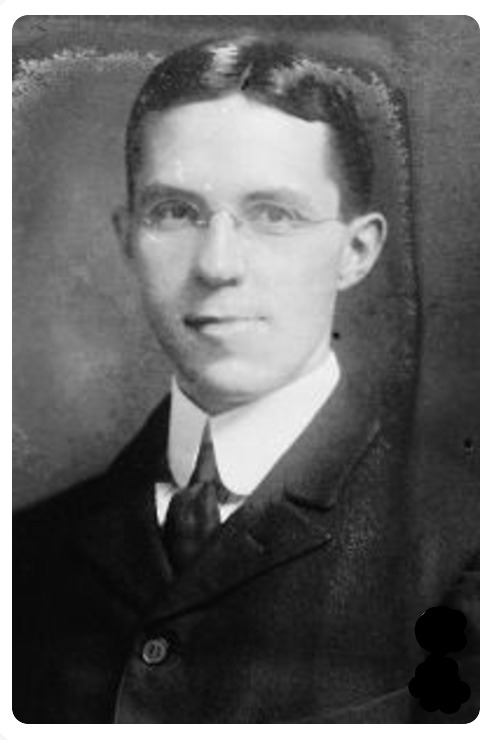
1873 – Daniel Gregory Mason, American composer, born (d.1953); Mason came from a long line of notable American musicians, including his father Henry Mason. He studied under John Knowles Paine at Harvard University from 1891 to 1895, continuing his studies with George Chadwick and Goetschius. In 1894 he published his Opus 1, a set of keyboard waltzes, but soon after began writing on music for his primary career. He became a lecturer at Columbia University in 1905, where he would remain until his retirement in 1942, successively being awarded the positions of assistant professor (1910), MacDowell professor (1929) and head of the music department (1929-1940). He was the lover of composer-pianist John Powell.

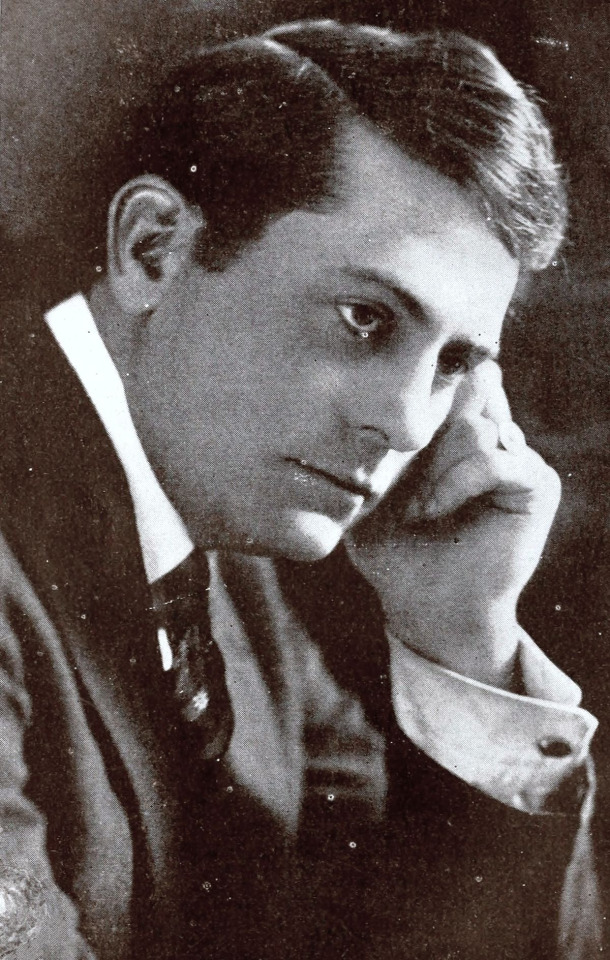
1883 – Edwin August (d.1964) was an American actor, director and screenwriter of the silent era. He appeared in 152 films between 1909 and 1947. He also directed 52 films between 1912 and 1919. He co-founded Eaco Films in 1914.
Edwin was born Edwin August Phillip von der Butz in St. Louis, Missouri, to August and Sarah Butz. He was educated at the Christian Brothers College.
He began working with Biograph Studios in New York as early as 1908 and moved to Hollywood with that company in 1910. He starred in several films by D. W. Griffith, who was also with the company, and continued to work well into the 1930s as a writer and director.
In 1916, he entered his name as a candidate for President of the United States, and spoke out against censorship in cinema. The candidate wasn't taken very seriously, and perhaps that wasn't the point. He didn't like the road that his industry was going down, and wanted to voice his opinion in the hope of change.
A co-star, Blanche Sweet, would later bluntly state: "He was a homo." He owned a chicken ranch at 648 South Figueroa in Hollywood and was friends with gay silent film star J. Warren Kerrigan and most likely Kerrigan's long time partner James Vincent.
Edwin passed away from cerebral metastatic disease on March 4, 1964 at the Motion Picture County Hospital in Woodland Hills, Los Angeles County, California.

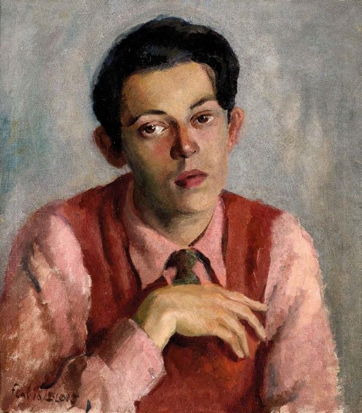
1916 – James Pope-Hennessy (d.1974) was a British biographer and travel writer.
James Pope-Hennessy was born in London on 20 November 1916, the younger son of Ladislaus Pope-Hennessy, a soldier from County Cork, Ireland, and his wife, Una, the daughter of Arthur Birch, Lieutenant-Governor of Ceylon. He was the younger of two sons; his elder brother, John Pope-Hennessy, was an English art historian, museum director and writer of note. James came from a close-knit Catholic family and was educated at Downside School and at Balliol College, Oxford, but generally showed a lack of interest in formal education and did not enjoy his time at either Downside or Oxford.
Largely owing to his mother's influence, he decided to become a writer and left Oxford in 1937 without taking a degree. He went to work for the Catholic publishers Sheed and Ward as an editorial assistant. While working at the company's offices, in Paternoster Row in London, he worked on his first book, London Fabric (1939), for which he was awarded the Hawthornden Prize. During this period, he was involved in a circle of notable literary figures including Harold Nicolson, Raymond Mortimer and James Lees-Milne.
He left the publishers in 1938 when his mother found him a job as private secretary to Hubert Young, the Governor of Trinidad. Although his time abroad provided the material for his later West Indian Summer (1943), he disliked both the West Indies and the atmosphere of Government House. The outbreak of the Second World War gave him an excuse to return to Britain, where he enlisted as a private in an anti-aircraft battery under the command of Sir Victor Cazalet. Rising through the ranks, he was transferred to military intelligence, given a commission and spent the latter part of the war as a member of the British army staff at Washington.
Pope-Hennessy enjoyed his time in the United States and made many friends there. After the end of the war he wrote an account of his experiences in America. On his return to London in 1945 he shared a flat with the British intelligence officer Guy Burgess, who later defected to the Soviet Union. He had a brief spell as the literary editor of The Spectator between 1947 and 1949, before he decided to travel to France and write Aspects of Provence, which was published in 1952.
He would eventually establish himself as one of the leading biographers of his time; his first effort in this direction being a two-volume biography of Monckton Milnes that appeared in 1949 under the titles The Years of Promise and The Flight of Youth. This was followed by further biographies of the Earl of Crewe and of Queen Mary, for which he was created Commander of the Royal Victorian Order in 1960. He also wrote a life of his grandfather, the colonial governor John Pope Hennessy, under the title Verandah (adapted as a documentary for BBC Television under the title "Strange Excellency", 1964), followed by an account of the Atlantic slave traffickers, Sins of the Fathers (1967).
In 1970, he took out Irish citizenship and went to live at Banagher in County Offaly, and during the next few years produced authoritative biographies of both Anthony Trollope and Robert Louis Stevenson. Trollope himself had chosen James' grandfather, John Pope Hennessy, as the basis for the character Phineas Finn in his novel of the same name. Robert Louis Stevenson was published posthumously and without revision in 1974. He became a popular figure in Banagher, evidenced by the fact that he was asked to adjudicate at a local beauty pageant and the horse fair, the oldest in Ireland. On being given a large advance he returned to London in 1974 to begin work on his next subject, Noël Coward.
Despite being a successful professional writer, Pope-Hennessy was careless with money. He suffered a series of financial crises and often relied on the goodwill of friends to get him by. A homosexual, he was a heavy drinker and frequented back-street bars and shady pubs where he mixed with a rough crowd, associations that eventually contributed to his death when he was brutally murdered on 25 January 1974 in his London flat by three young men. He had been sexually acquainted with one of them.

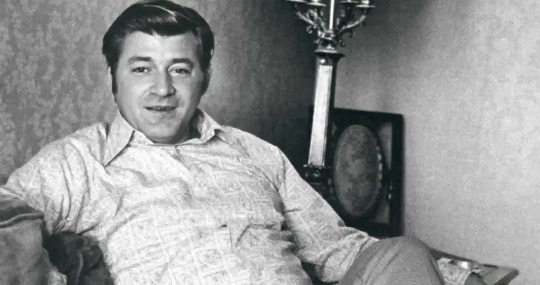
1941 – Oliver Sipple, the man who saved President Gerald Ford's life, was born today.
Sara Jane Moore attempted to assassinate U.S. President Gerald Ford outside the St. Francis Hotel in San Francisco, just seventeen days after Lynette "Squeaky" Fromme had also tried to kill the president. Moore was forty feet away from Ford when she fired a single shot at him. The bullet missed the President because bystander Oliver Sipple grabbed Moore's arm and then pulled her to the ground, using his hand to keep the gun from firing a second time. Sipple said at the time: "I saw [her gun] pointed out there and I grabbed for it. I lunged and grabbed the woman's arm and the gun went off." The single shot which Moore did manage to fire from her .38-caliber revolver ricocheted off the entrance to the hotel and slightly injured a bystander.
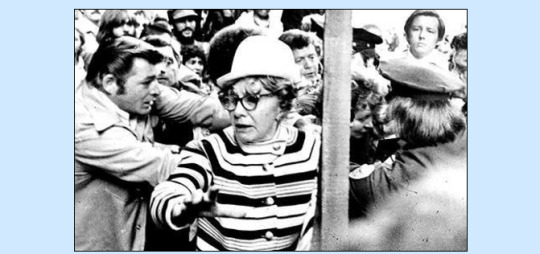
Sipple goes for the gun.
Sipple, a decorated Marine and Vietnam War veteran, was immediately commended by the police and the Secret Service for his action at the scene. The news media portrayed Sipple as a hero but would eventually report on his outing by Harvey Milk and other San-Francisco gay activists. Though he was known to be Gay by various fellow members of the gay community, Sipple had not made this public, and his sexual orientation was a secret from his family. He asked the press to keep his sexuality off the record, making it clear that neither his mother nor his employer had knowledge of his orientation; however, his request was not complied with.
The national spotlight was on him immediately, and Milk responded. While discussing whether the truth about Sipple's sexuality should be disclosed, Milk told a friend: "It's too good an opportunity. For once we can show that Gays do heroic things, not just all that ca-ca about molesting children and hanging out in bathrooms." Milk contacted the newspaper.
Several days later Herb Caen, a columnist at The San Francisco Chronicle, exposed Sipple as a Gay man and a friend of Milk. Sipple was besieged by reporters, as was his family. His mother, a staunch Baptist in Detroit, refused to speak to him. Although he had been involved with the Gay community for years, even participating in Gay Pride events, Sipple sued the Chronicle for invasion of privacy. President Ford sent Sipple a note of thanks for saving his life. Milk said that Sipple's sexual orientation was the reason he received only a note, rather than an invitation to the White House.
Sipple filed a $15 million invasion of privacy suit against Caen, seven named newspapers, and a number of unnamed publishers, for publishing the disclosures. The Superior Court in San Francisco dismissed the suit, and Sipple continued his legal battle until May 1984, when a state court of appeals held that Sipple had indeed become news, and that his sexual orientation was part of the story.
According to a 2006 article in The Washington Post, Sipple went through a period of estrangement with his parents, but the family later reconciled with his sexual orientation. Sipple's brother, George, told the newspaper, "(Our parents) accepted it. That was all. They didn't like it, but they still accepted. He was welcomed. Only thing was: Don't bring a lot of your friends."
Sipple's mental and physical health sharply declined over the years. He drank heavily, gained weight to 300 lb (140 kg), was fitted with a pacemaker, became paranoid and suicidal. On February 2, 1989, he was found dead in his bed, at the age of forty-seven. Earlier that day, Sipple had visited a friend and said he had been turned away by the Veterans Administration hospital where he went concerning his difficulty in breathing. His $334 per month apartment near San Francisco's Tenderloin District was found with many newspaper clippings of his actions on the fateful September afternoon in 1975. His most prized possession was the framed letter from the White House.
Sipple held no ill will toward Milk, and remained in contact with him. The incident brought him so much attention that, later in life, while drinking, he would regret grabbing Moore's gun. Sipple, who was wounded in the head in Vietnam, was also diagnosed paranoid schizophrenic according to the coroner's report.
Sipple's funeral was attended by 30 people, and he was buried in Golden Gate National Cemetery in San Bruno, California. A letter addressed to the friends of Oliver Sipple was on display for a short period after his death at one of his favorite hangouts, the New Belle Saloon:
"Mrs. Ford and I express our deepest sympathy in this time of sorrow involving your friend's passing..." President Gerald Ford, February, 1989
In a 2001 interview with columnist Deb Price, Ford disputed the claim that Sipple was treated differently because of his sexual orientation, saying: "As far as I was concerned, I had done the right thing and the matter was ended. I didn't learn until sometime later — I can't remember when — he was Gay. I don't know where anyone got the crazy idea I was prejudiced and wanted to exclude Gays."


1990 – A London judge convicted 14 gay men of committing criminal assaults upon themselves because of their participation in S&M. All 14 receive prison sentences.


1998 – John Geddes Lawrence and Tyrone Garner of Texas were ordered to pay fines of $125 each after being arrested for having sex in their home. The couple refused to pay and announced they would challenge the Texas sodomy law - initiating what became known as the historic "Lawrence vs Texas" Supreme Court decision which decriminalized homosexual sex.


4 notes
·
View notes
Text

If you’re in the NYC area, consider getting a ticket for the Amanda Serrano vs Erika Cruz card. It’s giving up Alycia Baumgardner vs Elhem Mekhaled, Ramla Ali, Skye Nicolson, Shadasia Green vs Elin Cederroos, and John Bauza vs Richardson Hitchins. Fun times!
4 notes
·
View notes
Text
The Kellys - Paul McCartney's domestics
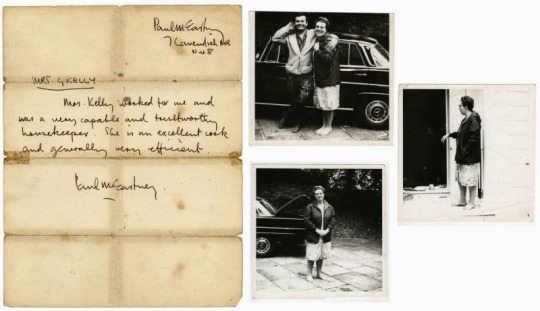
George and Gwen Kelly were employed by Paul McCartney for about a year (1966) at his house at Cavendish. The circumstances of their leaving are somewhat mysterious. Here's all the information on them that I could gather from public sources.
Paul bought the house at 7 Cavendish Ave on 13 April 1965 for £40,000. He then spent about £20,000 to renovate and redecorate, finally moving (from the Ashers' house on Wimpole Street) in March 1966. The house had (has) a basement, which served as living quarters for servants, a ground floor, and two floors above it. On the ground floor Paul installed an open-plan kitchen and a formal dining room.
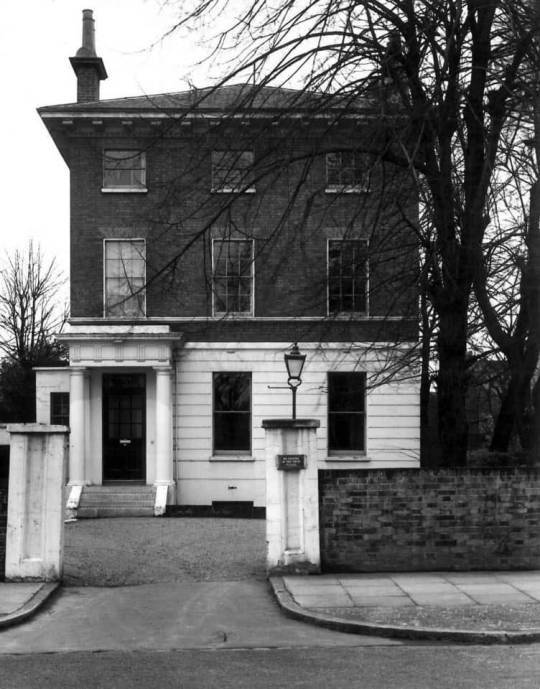
In Paul McCartney: The Life by Philip Norman (2016), he writes: "Paul’s brief to the Adamses [the designers] was the strangest they’d ever received, or ever would again; he said he wanted the kind of house where a smell of cabbage floated up from the basement...In fact, the house had no basement from which cosy cabbage-smells could waft to its upper storeys." 100% wrong: The house does have a basement, and you can see the windows to the basement in some photos. This was a standard design for houses at the time, with the main kitchen in the basement along with quarters for some of the staff. This is where the Kellys lived.
Even though he gets that wrong, we'll continue with Norman's book:
In those same Sunday colour supplements one could read how, if traditional domestic servants might have no place in the egalitarian Sixties, wealthy young bachelors often employed a live-in married couple, usually Spanish, the husband combining the roles of butler and chauffeur, the wife cooking and keeping house. Paul started out at 7 Cavendish Avenue with just such a couple, albeit Irish rather than Spanish and with the reassuring Liverpool-echoey name of Kelly. When he hired them, he gave warning that his household would be anything but a conventional one, and defined their main role as just ‘to fit in’. He soon discovered the drawback in having domestic servants, as noted by writers like Harold Nicolson back in the Victorian country house era: there are always people standing around, eavesdropping on your conversations, obliging you to shut the toilet door (all the more irksome if you’re fond of sitting there, playing guitar) and generally behave as if you’re in an hotel rather than at home. Mr Kelly, evidently seeing himself as Jeeves to Paul’s Bertie Wooster, would ceremonially lay out his young master’s clothes for the day ahead until firmly dissuaded. Pop star pals who stayed overnight, and expected to be left comatose until after noon, would instead be briskly roused by Mr Kelly with early morning tea. On the big dining-room table, he placed a display of silverware whose highly-polished formality was too much even for Paul; to annoy them, he’d take out the ornate silver cruet and put a cheap plastic one in its place.
The "to fit in" quote is from a short piece that appeared in the London Sunday Times on September 18 1966, by Hunter Davies, titled "ATTICVS: All Paul":
Paul McCartney was in his new mansion in St. John's Wood. He lives alone. A Mr. and Mrs. Kelly look after him. Nothing so formal as a housekeeper and butler. Their job, he says, is just to fit in.
Barry Miles, in Many Years From Now (1997), picks up the silver cruet story:
There was a large dining table with an antique lace tablecloth, which was always beautifully set with all the appropriate cutlery, but it had a plastic salt cellar and pepper shaker in the centre. Paul owned silver ones but insisted on using the cheap ones, mainly to annoy the housekeeper, Mrs Kelly, and her husband, who had previously worked for gentry and let it be known, not very subtly, that they regarded their new position as a step down in the world. The husband had initially attempted to continue his role as gentleman's gentleman by laying out Paul's clothes each morning until Paul made it abundantly clear that this was not required. Every time they set the table the silver cruet was laid and each time Paul replaced it with the plastic one. Paul fired them for selling their story to an Australian magazine... “I had this live-in couple called the Kellys who would wake you up early in the morning like everything was just going normally and we had just stayed up all night and it was like, 'Go away please!'”
Nicholas Schaffner's book The Beatles Forever (1977) has this information from George Kelly:
George Kelly, a veteran of 16 years of service in the Royal Army who went on to become butler and chauffeur at some of Britain’s most stately homes before being hired by Paul McCartney in 1966, recalls with distaste in his memoirs having to bring morning tea for two to Paul’s bedroom when Jane was away, and having to endure the sight of the Beatle stubbing out ciggies on his silver Ivor Novello awards. But nothing seems to have unhinged Kelly more that the time he accidentally stumbled in on “one of the most bizarre scenes I have ever witnessed. There, in front of the television set, were the highest-paid pop group in the world and their manager, bowing down and salamming, chanting and dancing with one another!” Kelly recalls making his way through the billowing incense and flashing colored strobelights to give Paul a message, but “nobody took the slightest notice of me. They were all on their own little clouds. So as the Eastern music…grew louder, I just left the room quietly.” Shortly afterward, the butler handed in his notice, but not before receiving lectures from his employer about the benefits of LSD: “Your whole life flashes before you and you realize all the mistakes you have made.” (p. 76)
Schaffner says this is from Kelly's "memoirs", but I can't find any evidence of these memoirs being published. It's possible Schaffner had access to an unpublished manuscript; the quotes certainly read like something written, not an interview.
In addition to serving morning tea at noon and whatever else they were doing, they had to deal with the endless stream of fans. At Meet the Beatles For Real, Carol Bedford talks about visiting London in the summer of 1966:
“I couldn't have been there for more than two minutes when Mr. Kelly, Paul's gardener, came out screaming and waving a hoe at me. He said that Paul had just come in at 3 a.m. and needed rest. I looked up to see the curtains being rustled on the middle window of the second floor. Mrs. Kelly came out, and when asked if Paul and Jane were married, she answered, "No, of course not! That's a bunch of rubbish!"
(Lizzie Bravo added, "Funny, I remember her husband, Mr. Kelly, we called him "Stick" and he was pretty nasty but I don't remember her...")
So did they quit, or were they fired? They were gone by the end of January 1967. Here's an article published January 12, 1967 that ran in several American newspapers; this was titled "They’ve Had Enough of That Job, Thank You":
George and Gwen Kelly, who were Beatle Paul McCartney’s chauffeur and housekeeper until they quit recently, read a newspaper ad saying a Mr. Brown needed a chauffeur and housekeeper. George telephoned the employment agency that had advertised, said he and wife might be interested and asked for details. “Yes,” said the voice on the telephone. “Your prospective employer lives in St. John’s Wood—” “Did you say St. John’s Wood? We know the area very well. We’ve got friends there. We used to work in St. John’s Wood.” “And the wages are good,” said the agency man. “Go on, please,” said George. “There’ll be lots of entertaining. You will see a lot of interesting people.” “Tell me,” said George, “what sort of a chap is Mr. Brown?” There was a long pause. Then in a low, confidential voice, the agency man said: “Now, you must promise not to say anything, but Mr. Brown is really Paul McCartney—one of the Beatles, you know.” “I know,” said George. “Thank you for your trouble in answering my questions.” “When will you be coming in for an interview?” asked the agency man as George hung up. When the Kellys left McCartney, George said he and his wife thought they would be happier working for someone with more regular hours.
(They're not wrong!)
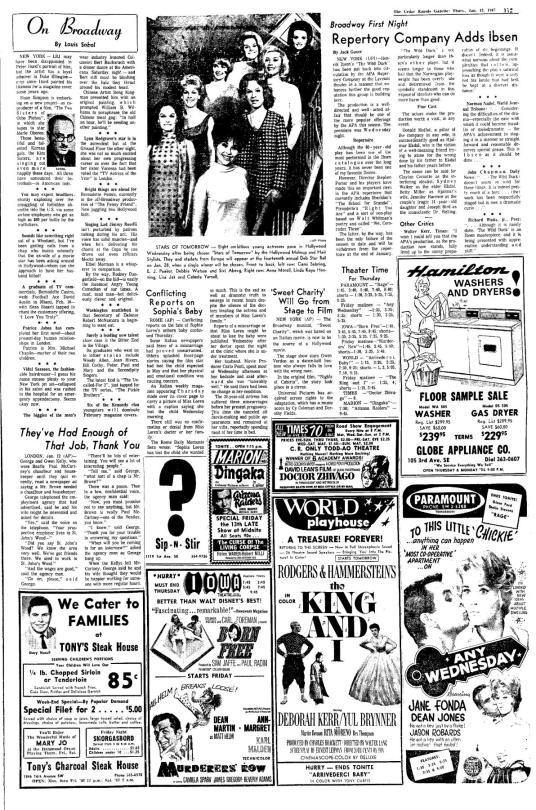
Back to Norman:
Paul’s live-in domestic couple, the Kellys, had left his employment in January 1967, after Mrs Kelly talked out of turn to an Australian newspaper, though he still hand-wrote her a reference calling her ‘efficient and trustworthy’. After trying another couple, the Millses, he found Rose Martin (no relation to George), an unflappable, unshockable woman who would serve him with irreproachable loyalty and discretion for many years to come. However, Rose was fiercely loyal to Jane, so treated Maggie with barely restrained hostility.
And back to Miles:
Paul asked his housekeepers, the Kellys, to leave after he found that they had written an article about his home life for an Australian magazine. Paul: “Mr and Mrs Kelly are looking for another place and I’m getting another couple to replace them. There have been disagreements over the running of the household. I haven’t asked them to leave instantly because that would be unreasonable.” They were replaced by Mr and Mrs Mills. (“She still hasn’t given me a tune yet,” quipped Paul, referring to popular pianist Mrs Mills.)
And then we have Mike McCartney, who has a different story - here he's talking about his photo of Paul's smashed-up face:
The fab pic was eventually stolen from Cave Avenue by a ‘butler’ and sold to an Italian mag to illustrate ‘wild Beatle drug parties in swinging London’.
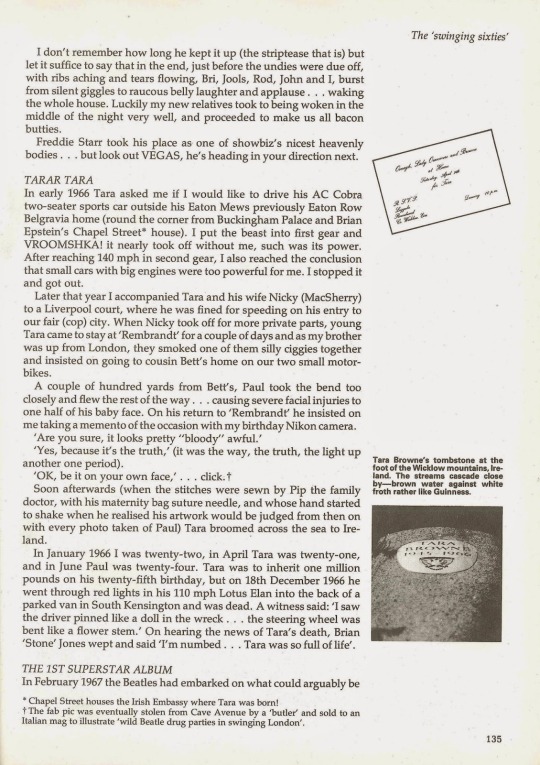
(I'm pretty sure he's conflating stories here - I don't remember reading anywhere else that his photo was stolen)
The only contemporary account of their departure I can find in the newspapers is from The Daily Mirror on January 6, 1967.
Beatle’s Staff Driven Out By His Fans By Kenelm Jenour
The married couple who act as housekeeper and chauffeur to Beatle Paul McCartney have given him their notices. The reason: They could not stand the fans any more. The couple, George and Gwen Kelly, have looked after Paul at his £40,000 London home behind Lord’s cricket ground since he moved in almost a year ago. Last night, while Paul was recording with John, George, and Ringo, Mr. Kelly told me: “Paul has been a good boss. But the fans have been a terrible strain. “In fact sometimes it’s been murder. We’ve had no private life at all. “Sometimes we can’t even get into the house because of fans crowding around outside. And we get phone calls from all over the world at all hours of the night.” The Kellys, both aged 40, told Paul on Wednesday of their decision to quit. But they did not set a date for leaving. “We don’t want to leave him in the lurch,” said Gwen in their basement flat at Paul’s home. “We will probably go in four or five weeks.” Engaged Gwen, who once worked with her husband for the Lord Lieutenant of Monmouthshire, went on: “We didn’t even know Paul was a Beatle when we came here. All we knew was that we had been engaged by a Mr. Paul McCartney. “And that’s what we have always called him - ‘Mr. McCartney’ or ‘Sir.” He hates any familiarity.” One thing the Kellys stressed: They are not leaving Paul, the only bachelor Beatle because he wants to get married. “As far as we know - and we probably know him as well as anyone - he has no immediate plans to marry,” said George.
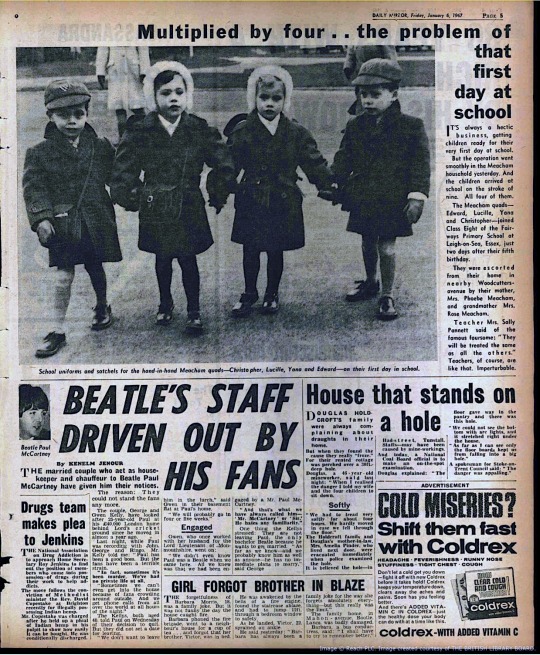
The image at the top of this post is Paul's letter of recommendation for Gwen Kelly, which was sold at auction in 1993 for £250, according to The Paul McCartney Encyclopedia by Bill Harry (2003). It seems to have been sold through Tracks Ltd. in the UK. Here's the description:
A one-page job reference for a housekeeper, Mrs. G. Kelly, who Paul McCartney employed for a brief period in the mid-sixties in his home in Cavendish Avenue, London. Mrs. Kelly resigned as housekeeper due to differences with Paul about the running of the home. The reference dates to 1967. It reads, "Mrs G Kelly, Mrs Kelly worked for me and was a very capable and trustworthy housekeeper. She is an excellent cook and generally very efficient. Paul McCartney". It comes with four black & white modern prints of photographs of Paul McCartney's home which were formerly the property of Mrs. Kelly, (3 of these depict the housekeeper on the forecourt of the house) an original newspaper clipping relating to her resignation and a modern print out of another newspaper cutting. Three of the photographs measure 9cm x 9cm (3.5 inches x 3.5 inches), the fourth measures 10.5cm x 8.5cm (4.25 inches x 3.25 inches). The photographs are not being sold with copyright. The reference letter measures 20cm x 25cm (8 inches x 10 inches). It has tears and tape stains on the folds. The condition of the letter is fair.
Back to Norman:
Paul’s live-in domestic couple, the Kellys, had left his employment in January 1967, after Mrs Kelly talked out of turn to an Australian newspaper, though he still hand-wrote her a reference calling her ‘efficient and trustworthy’. After trying another couple, the Millses, he found Rose Martin (no relation to George), an unflappable, unshockable woman who would serve him with irreproachable loyalty and discretion for many years to come. However, Rose was fiercely loyal to Jane, so treated Maggie with barely restrained hostility.
I have spent considerable time searching online for "the Australian newspaper/magazine" that the Kellys supposedly sold their story to, but I can't find anything at all. Three possibilities:
The story was published in a small paper or magazine but isn't available online or in an archive
They talked to an Australian reporter but the story was never published, perhaps due to pressure from Beatle management (Murdoch involvement? He owned many newspapers in Australia at that time)
It was a rumor that got published as truth and keeps getting recycled; they really left because the situation was intolerable
I can't find any more information about what happened to the Kellys after they left Cavendish. I would love to know the end of their story!
(Honestly, being Paul's housekeeper in 1966 sounds like the worst job in the world.)
3 notes
·
View notes